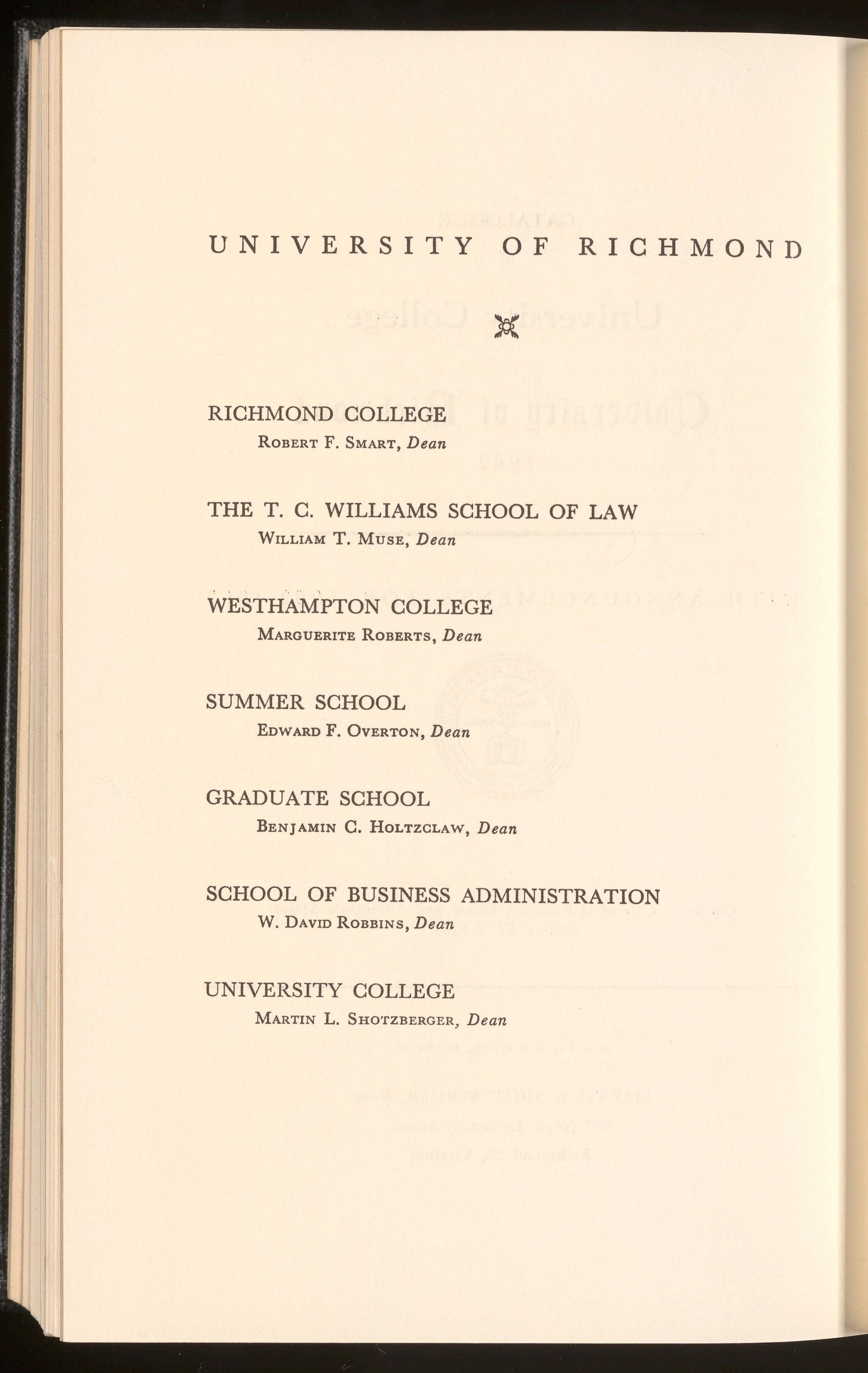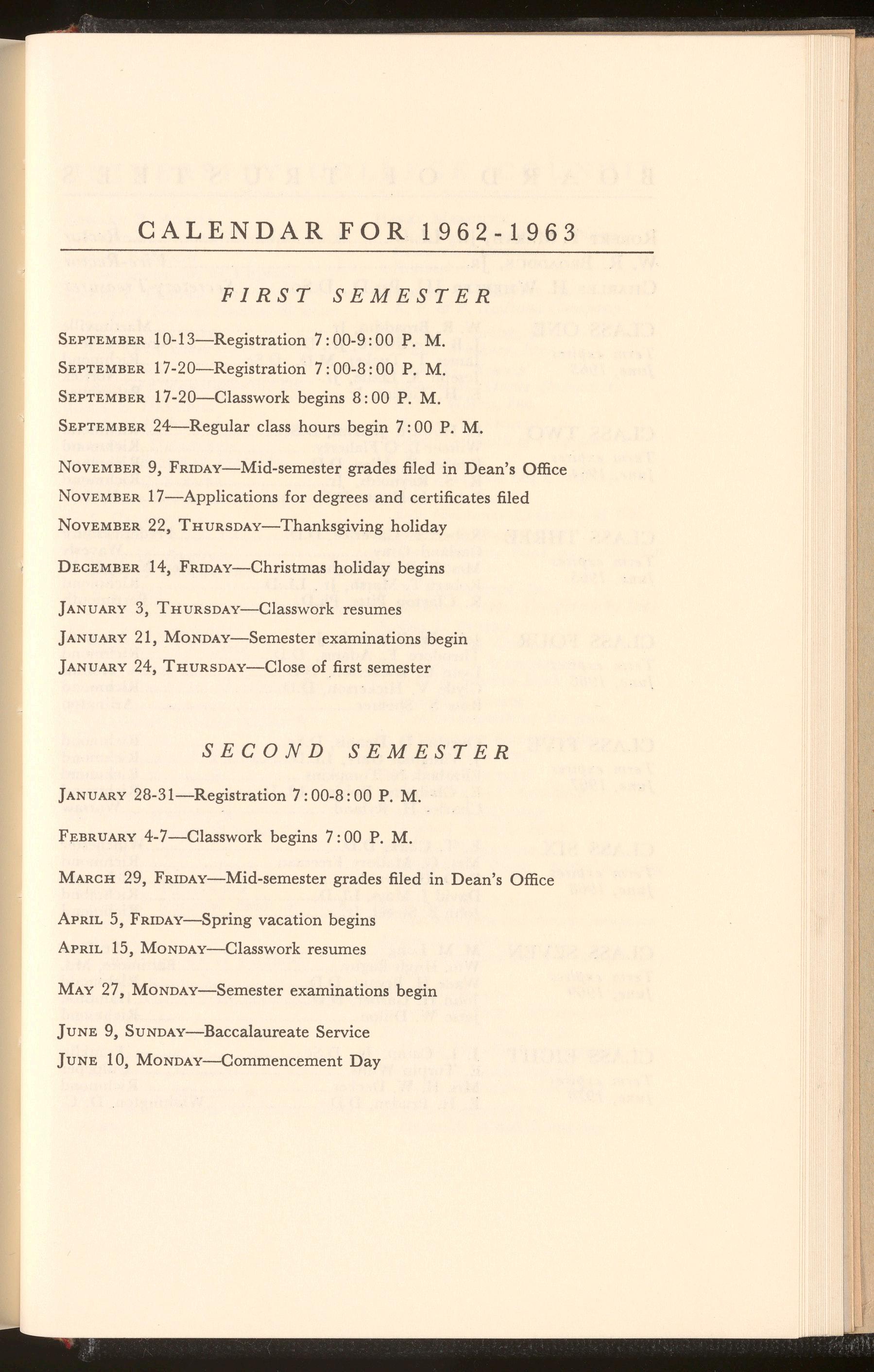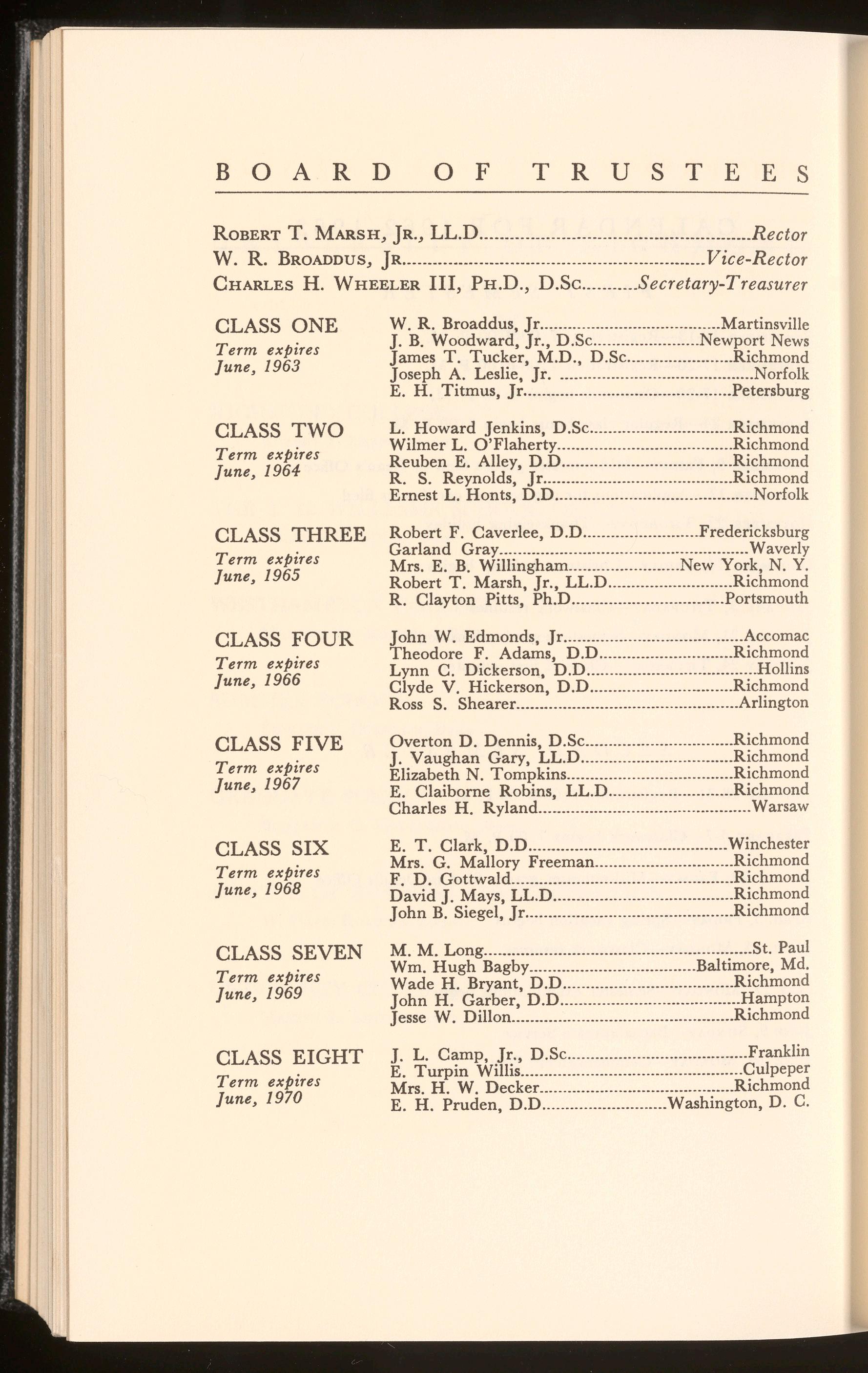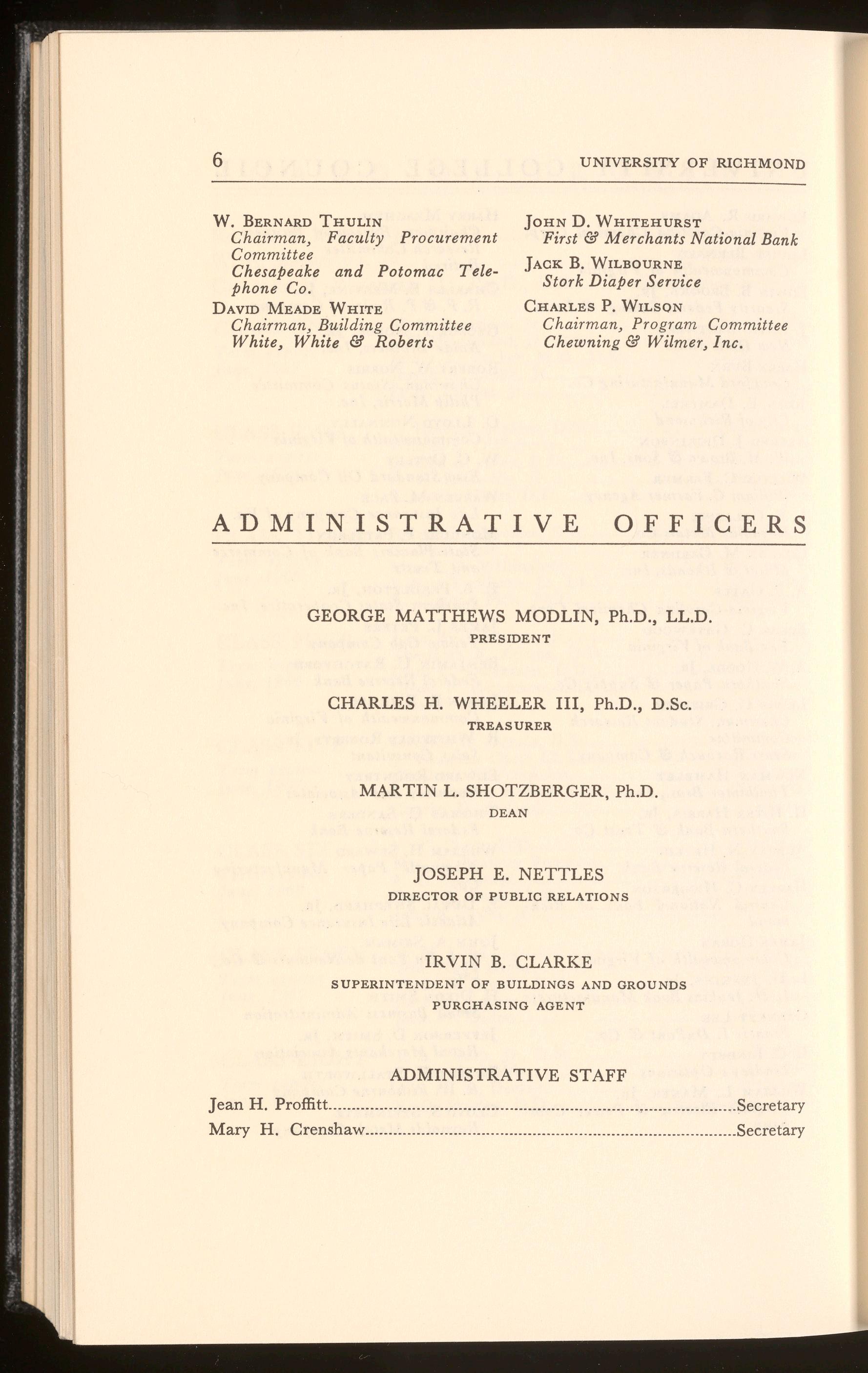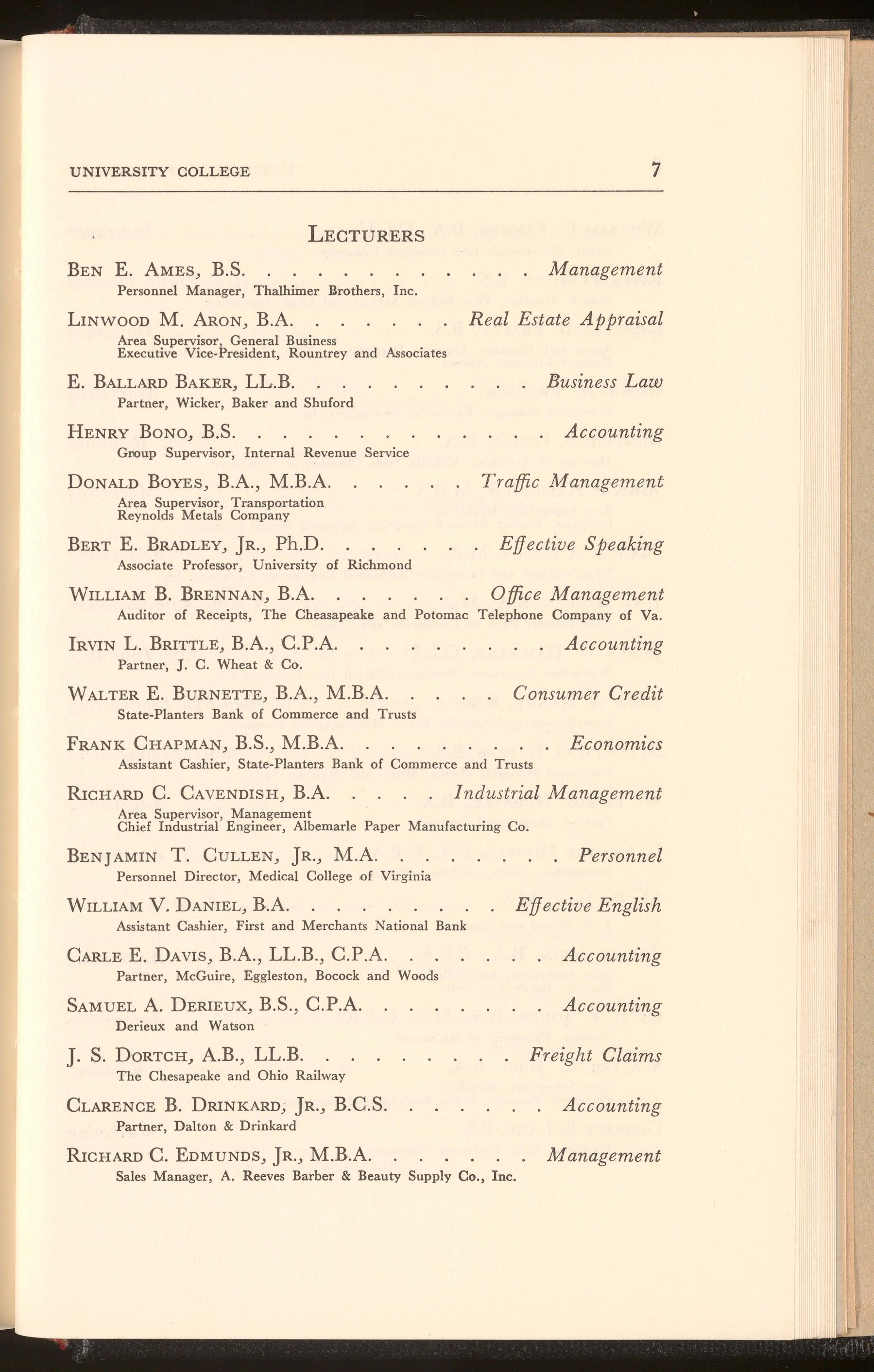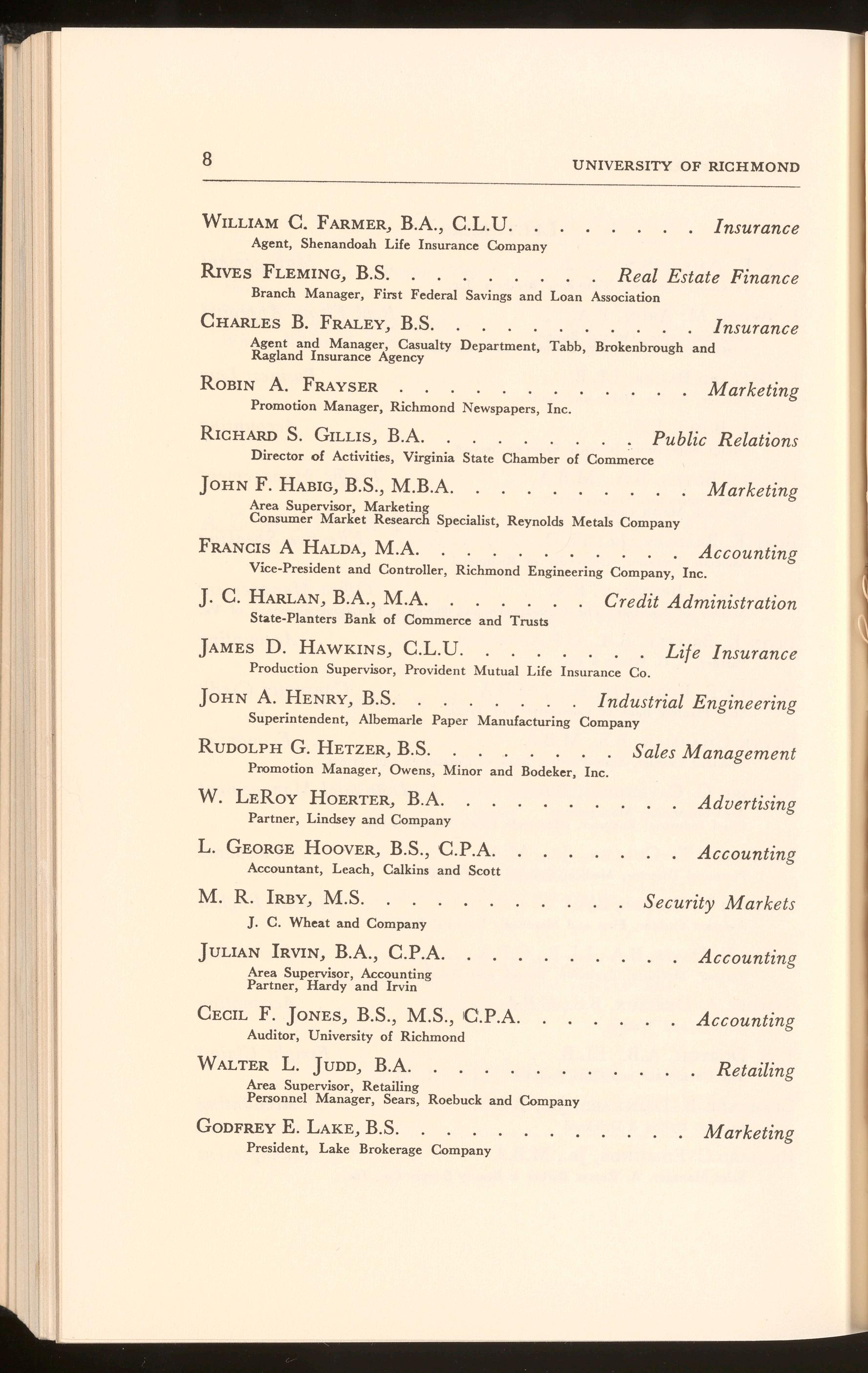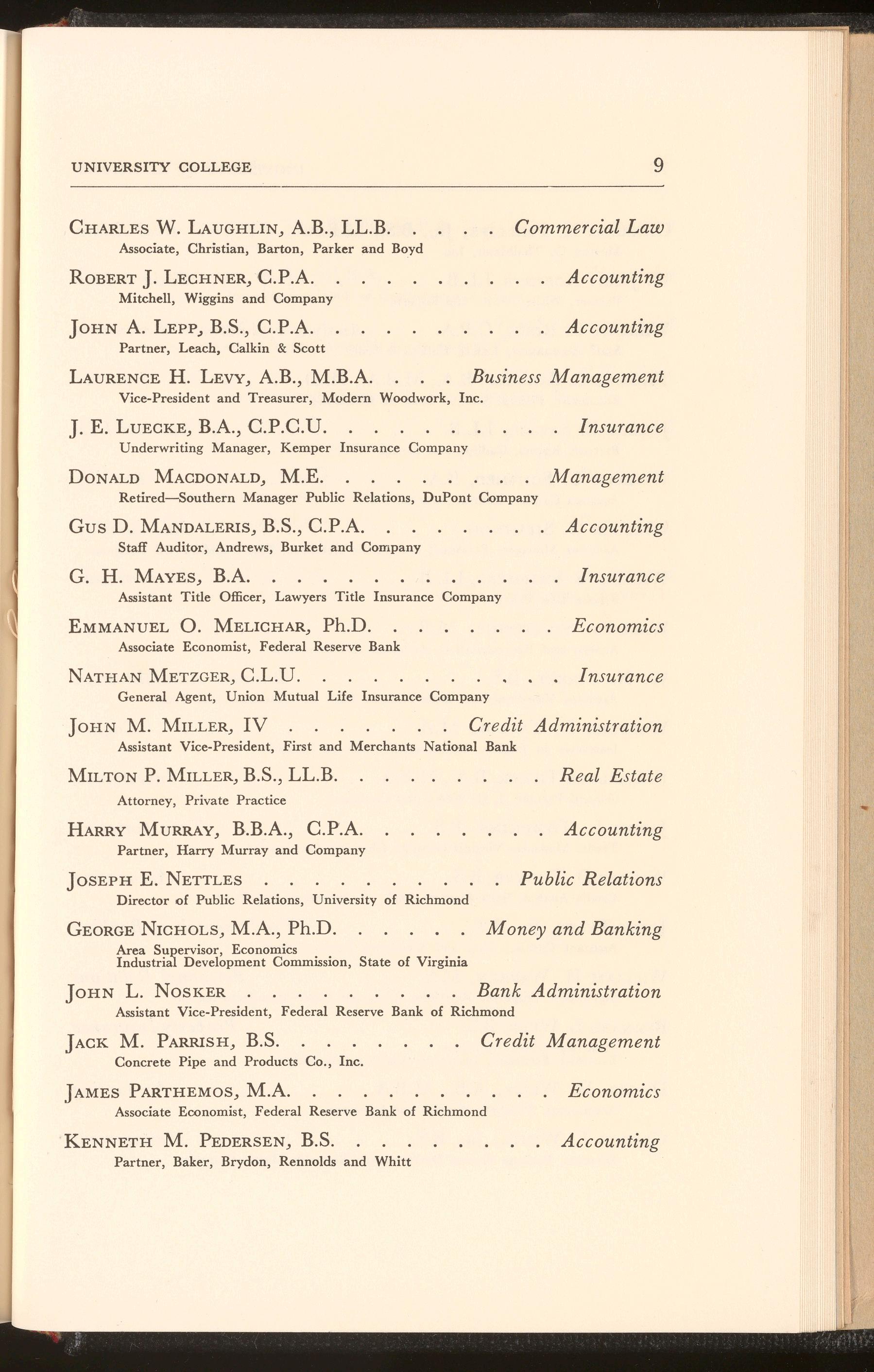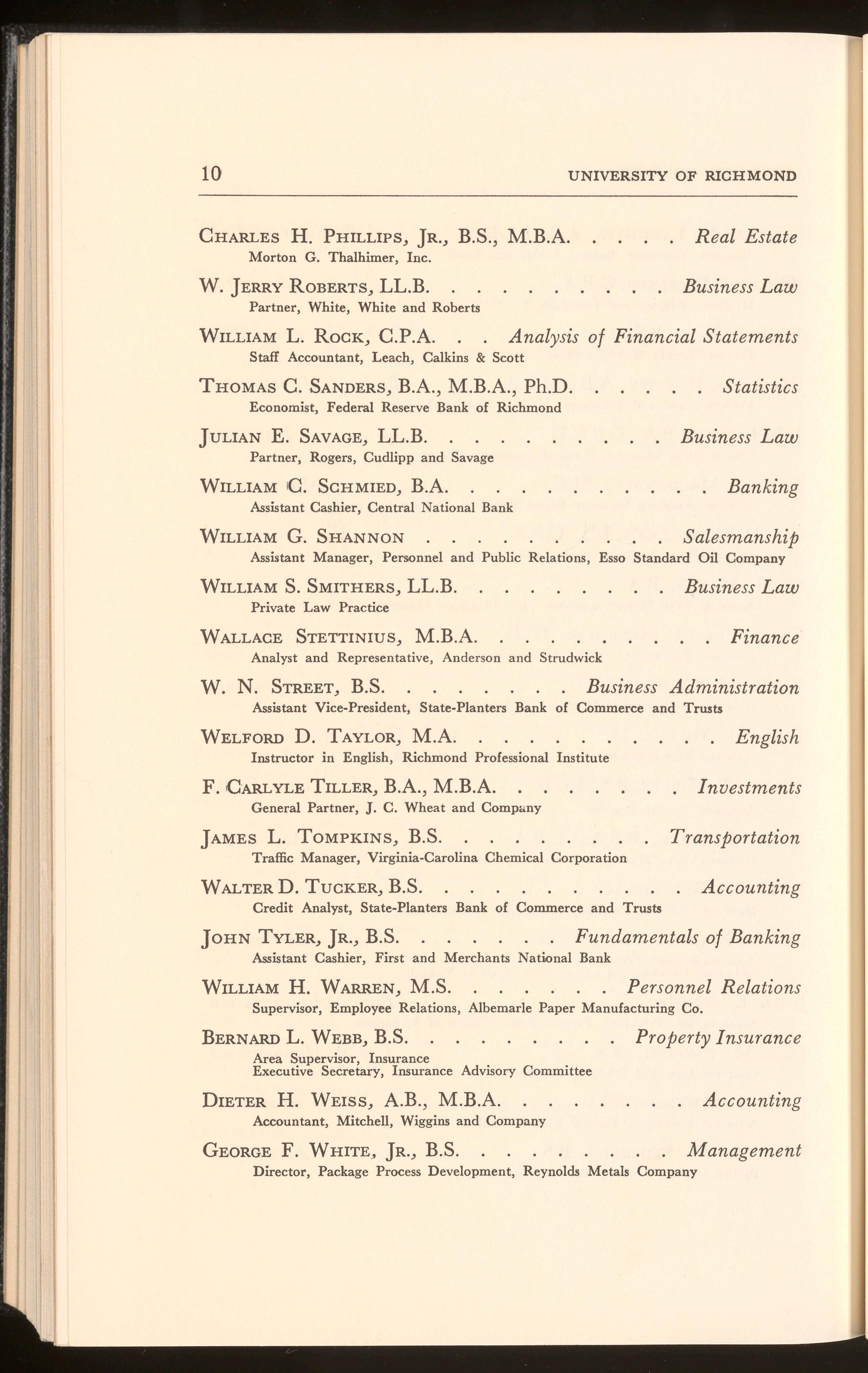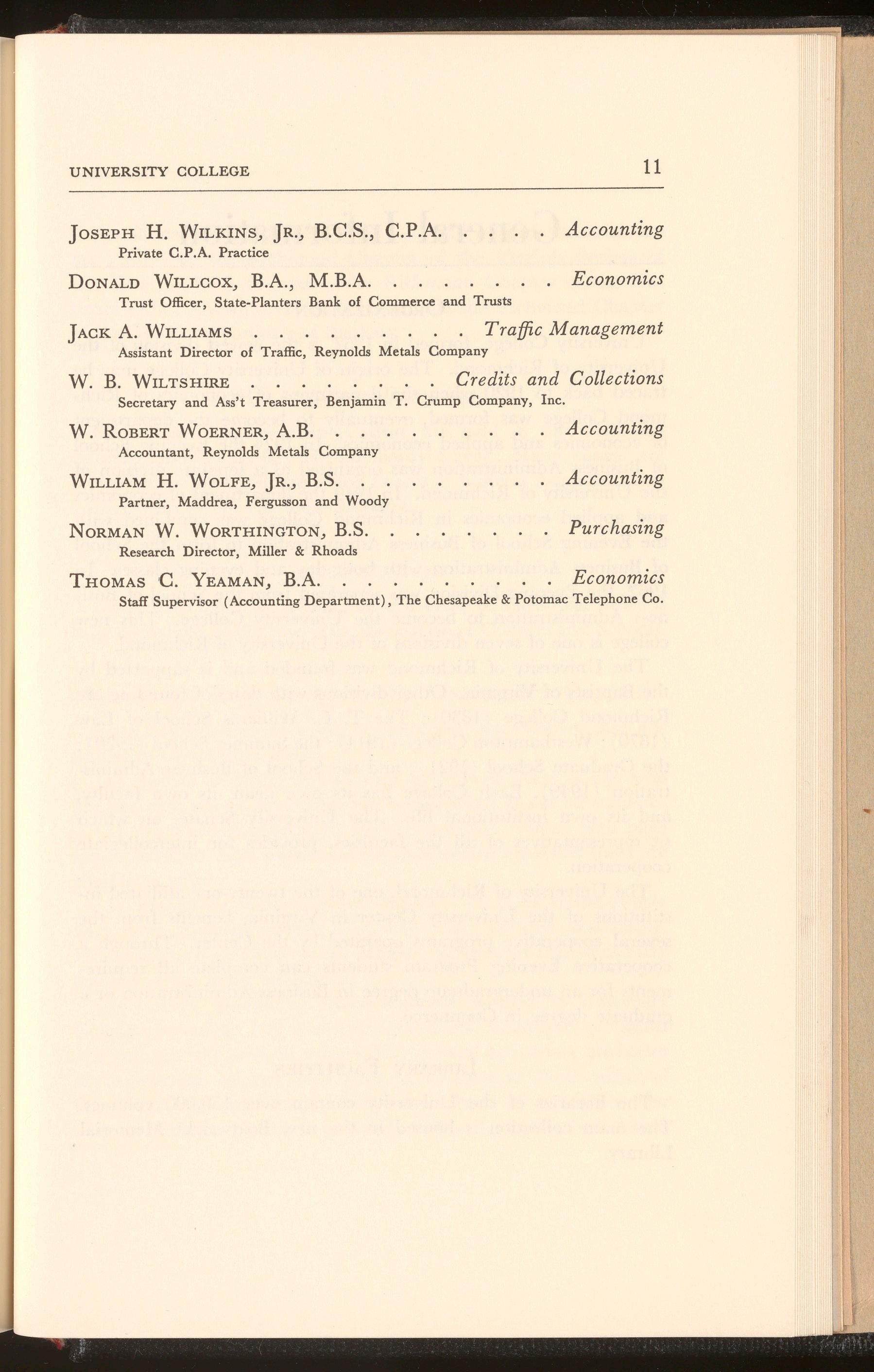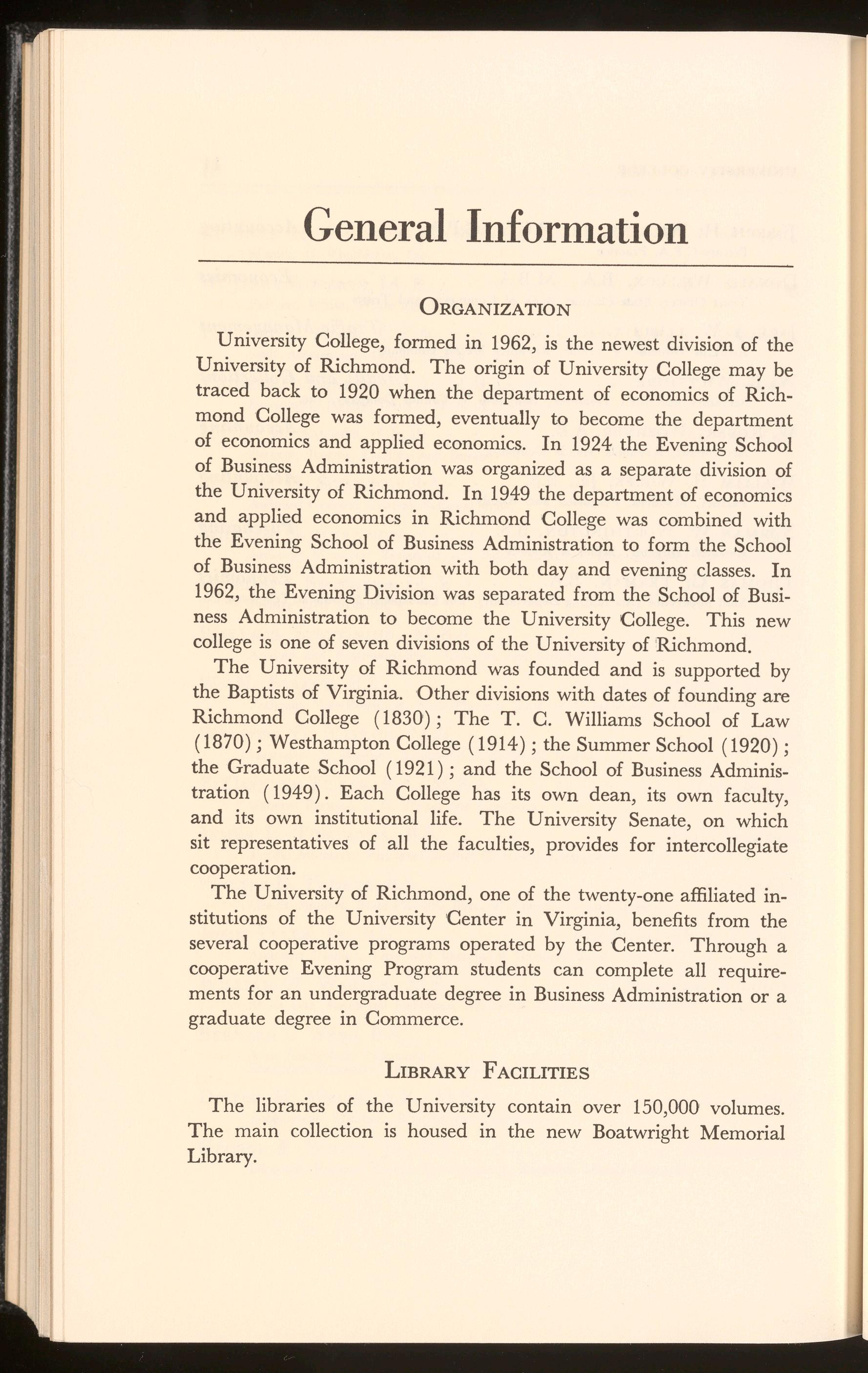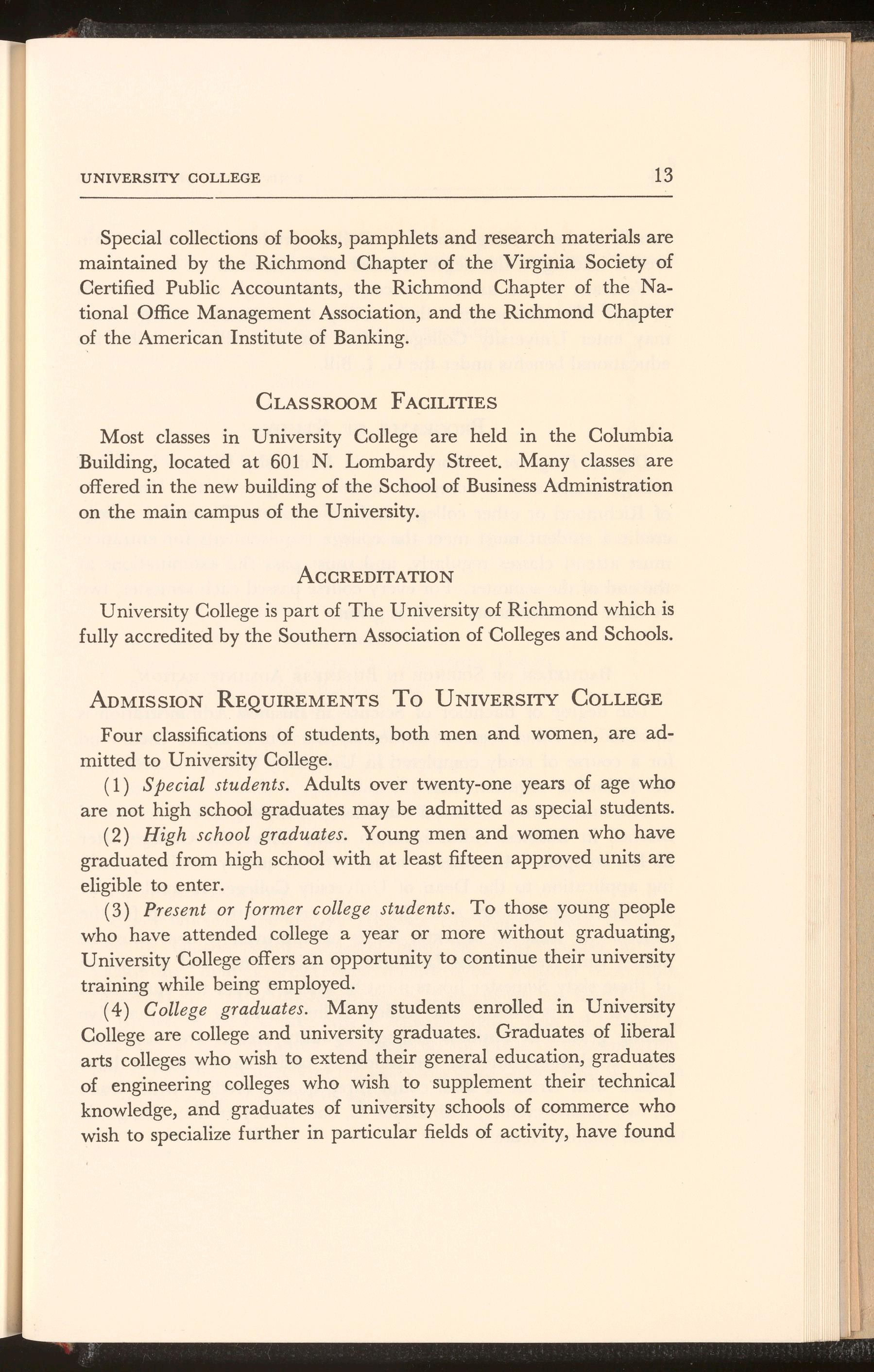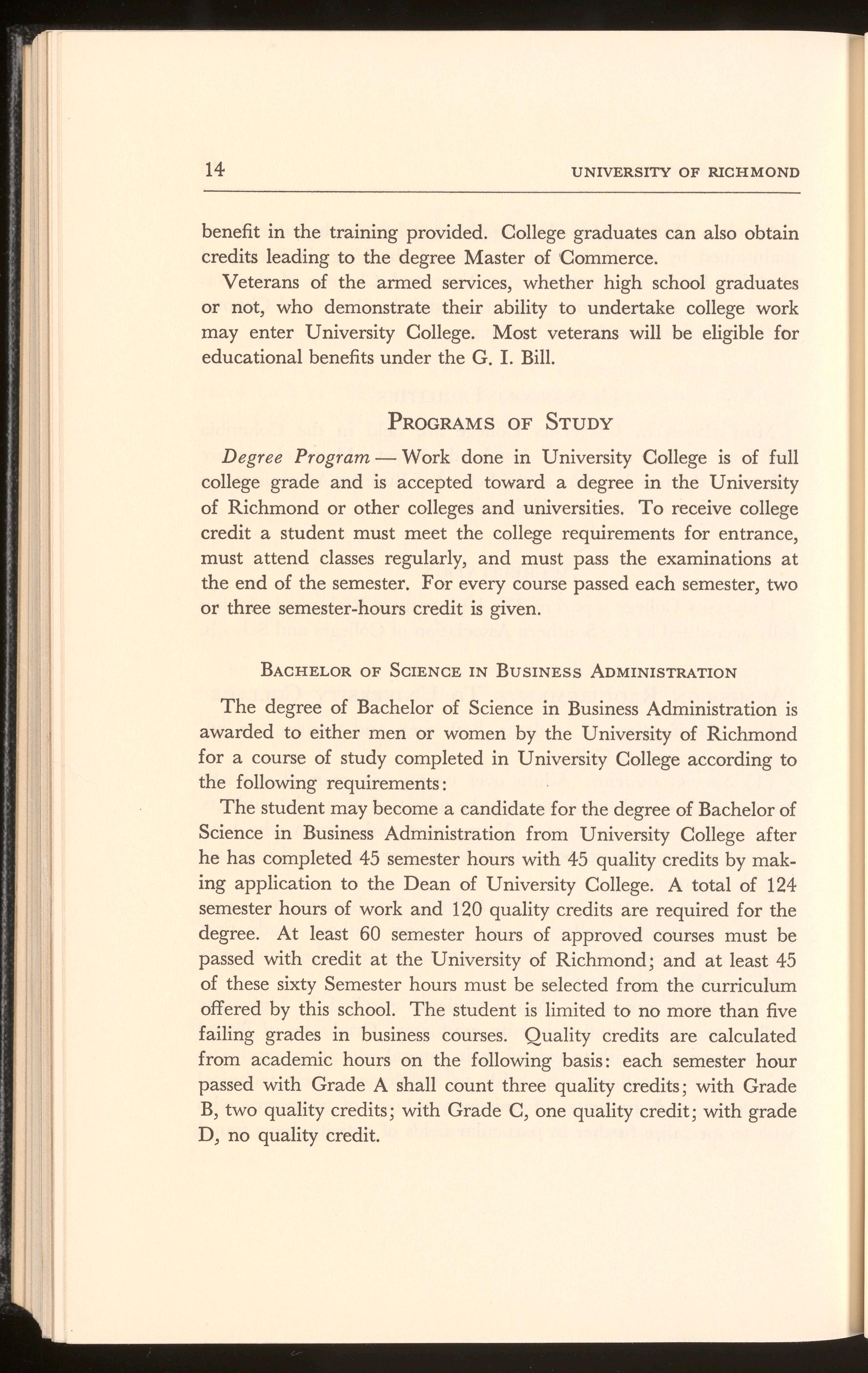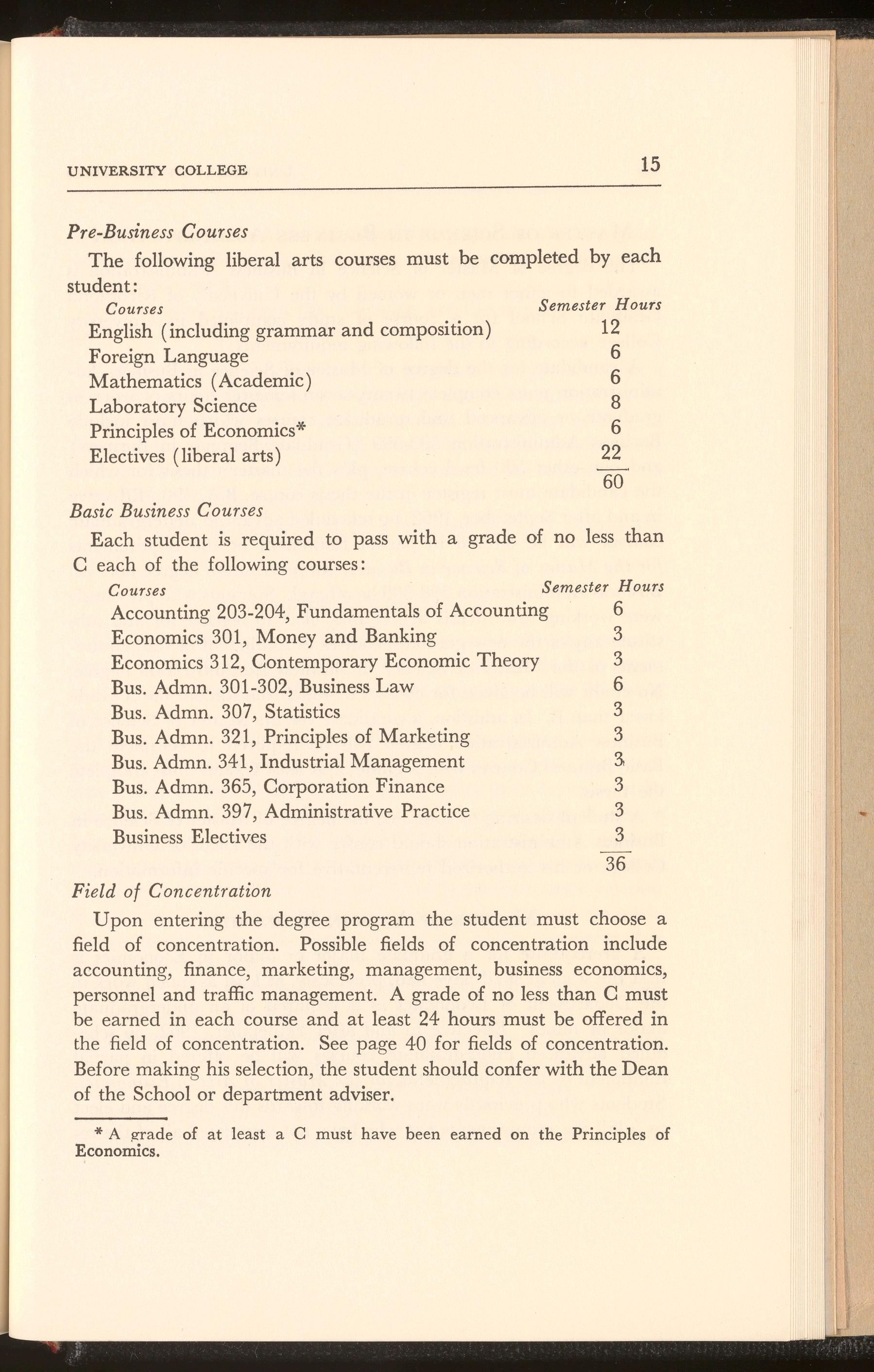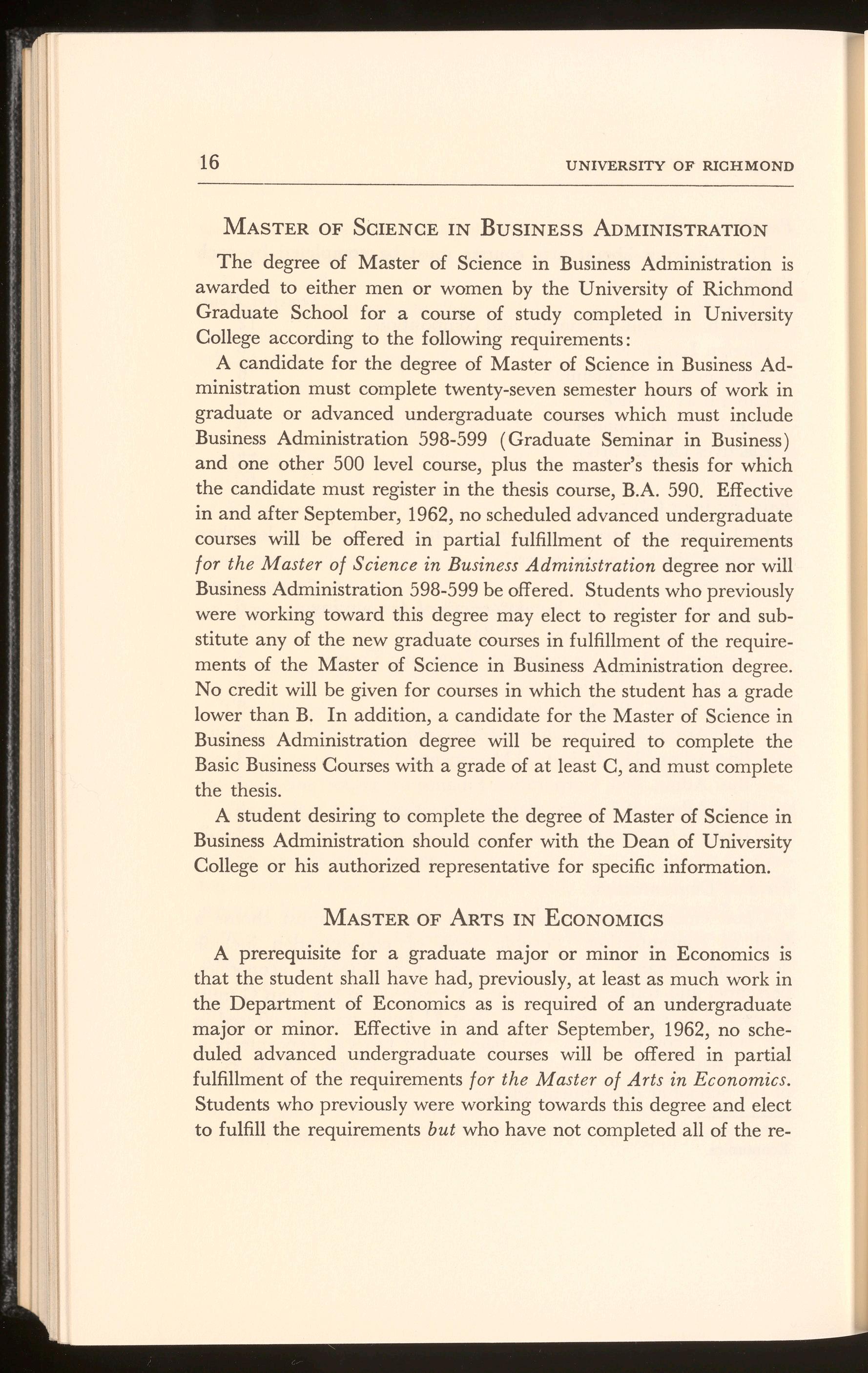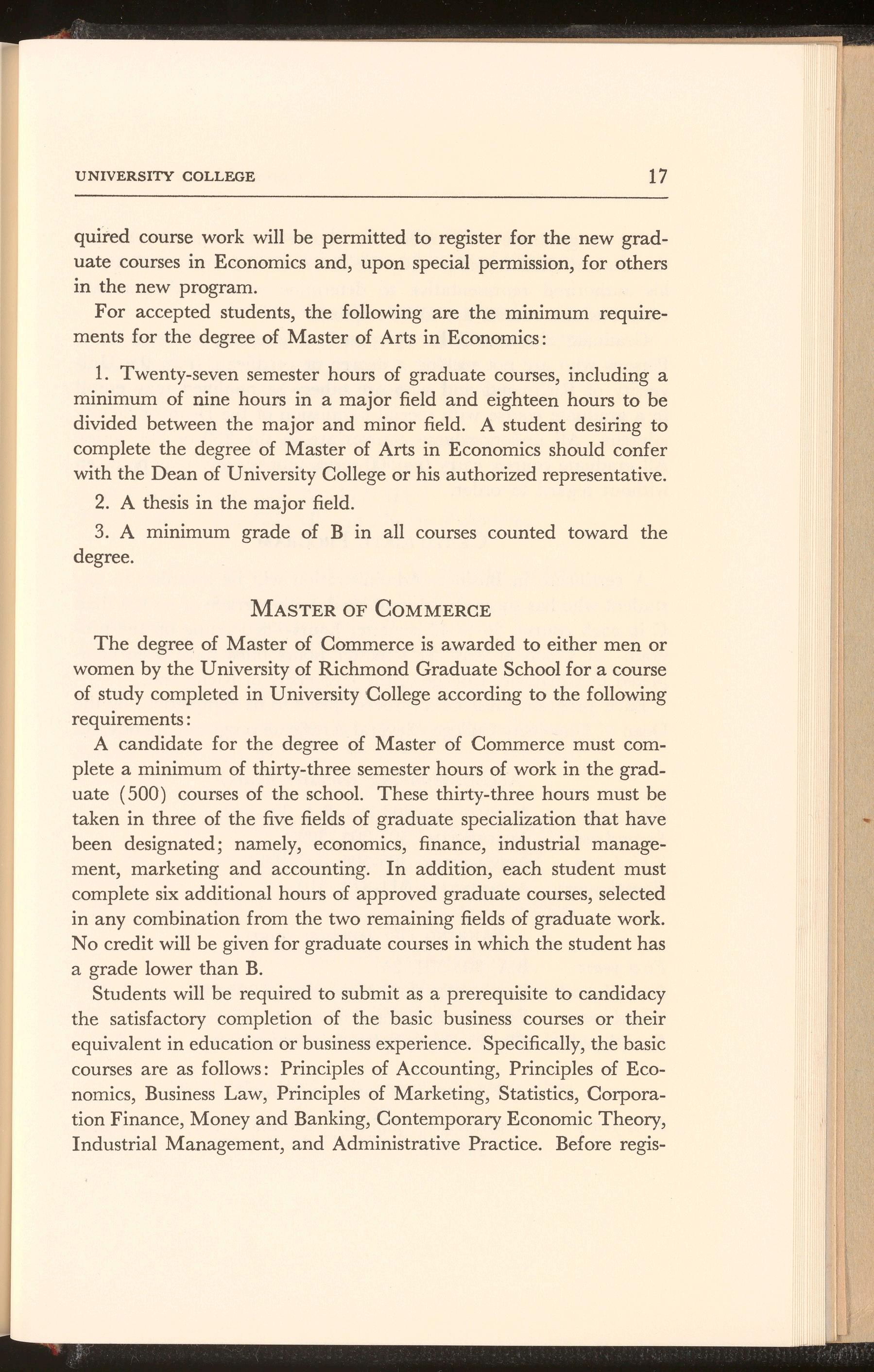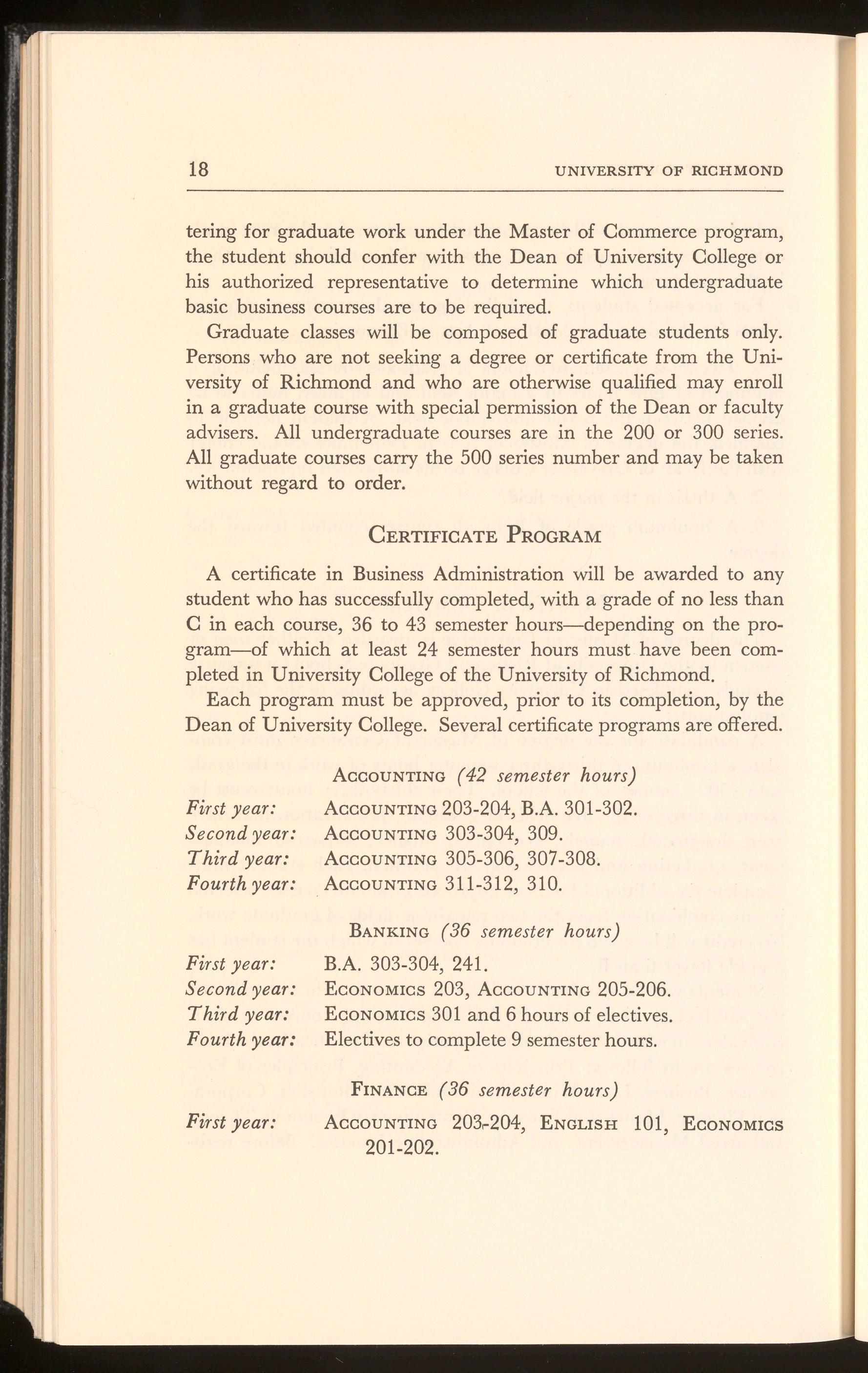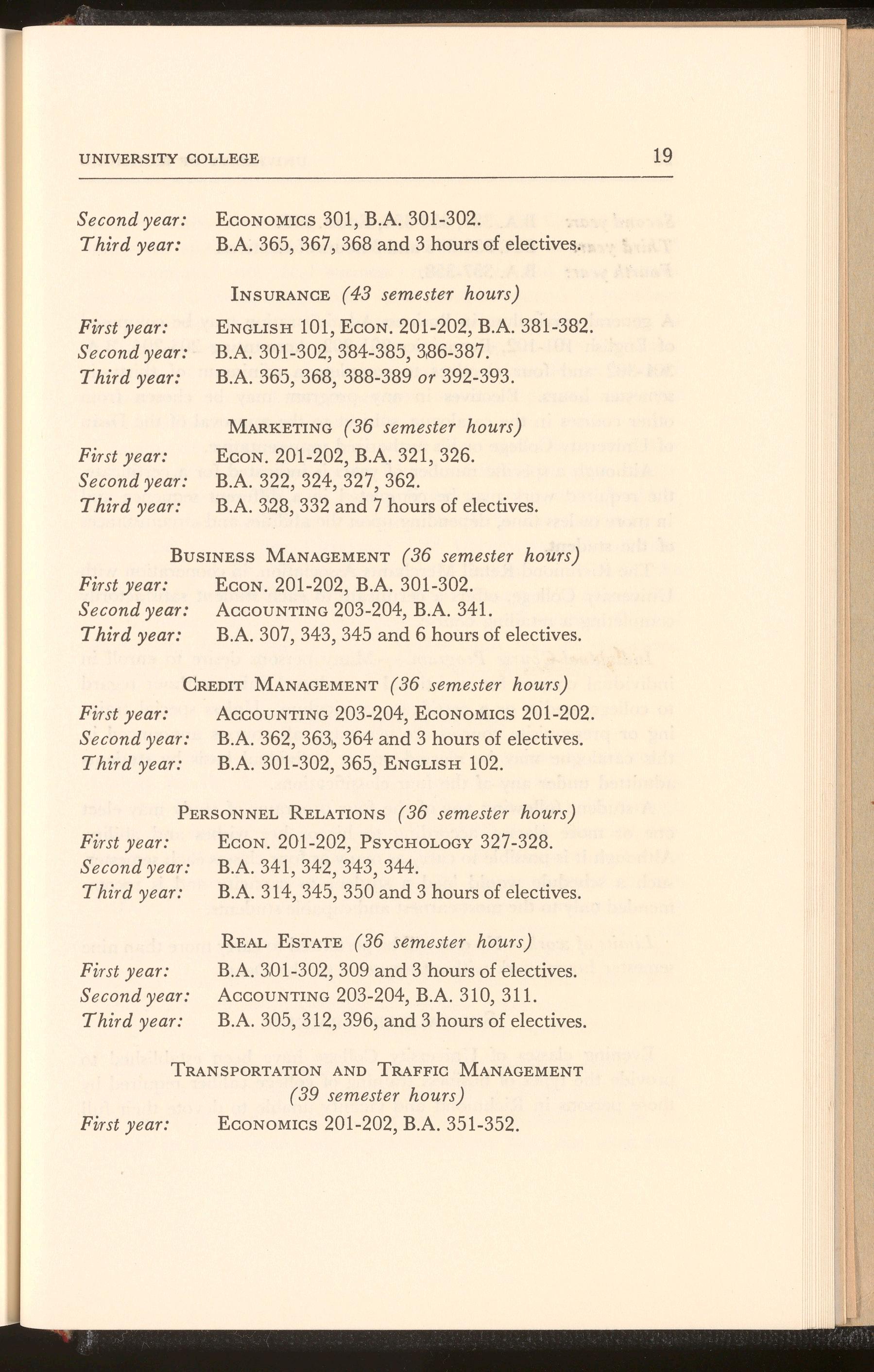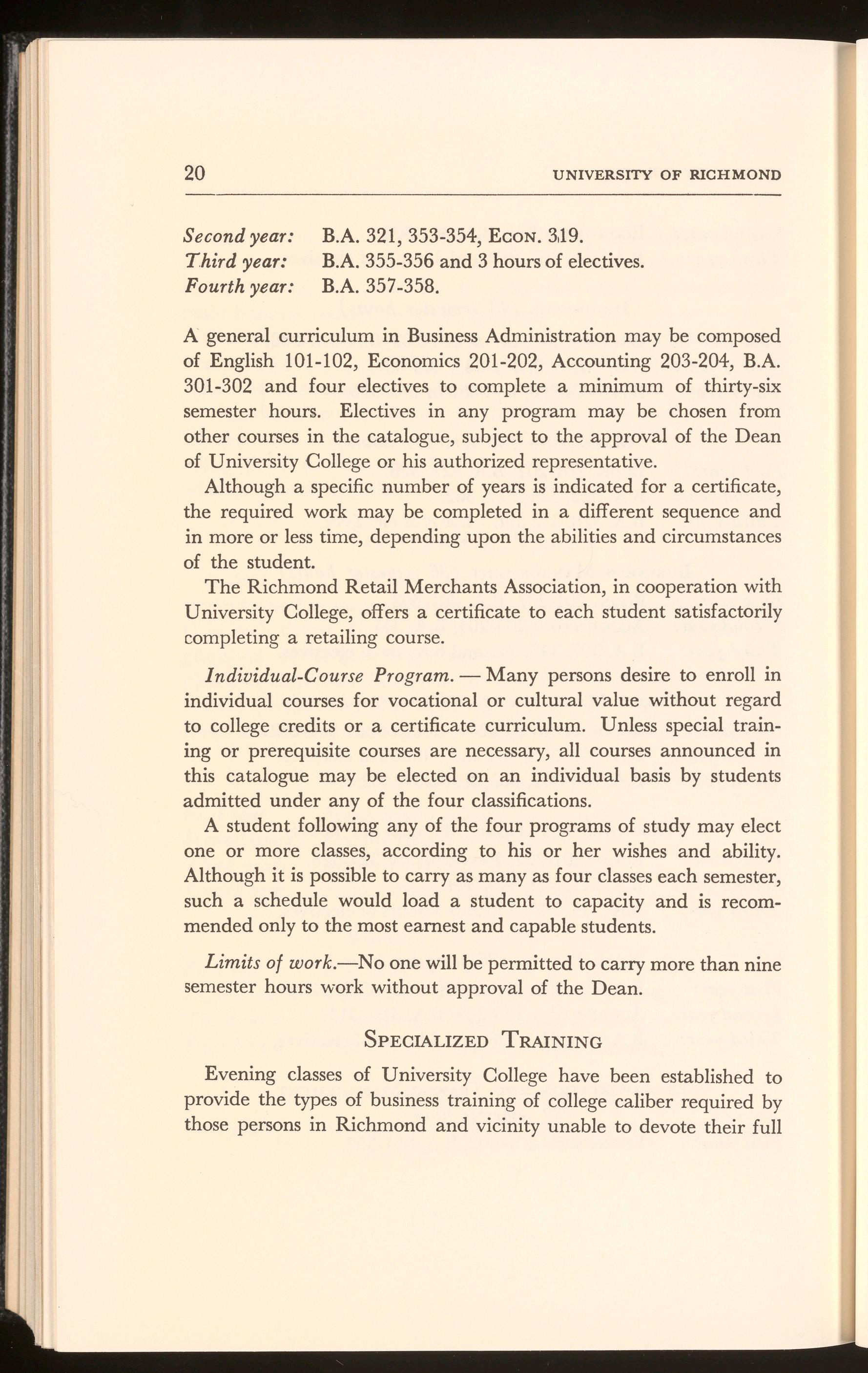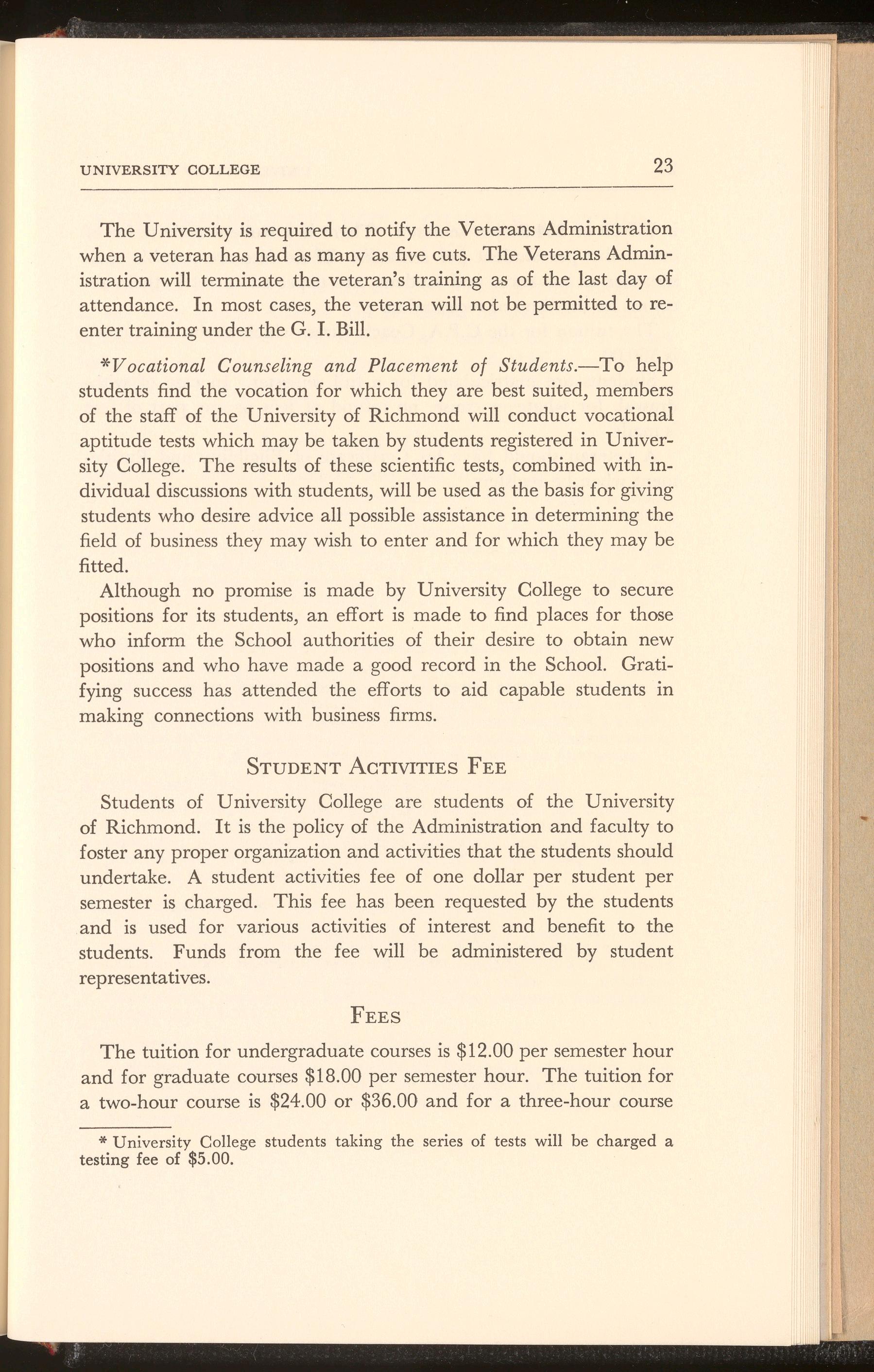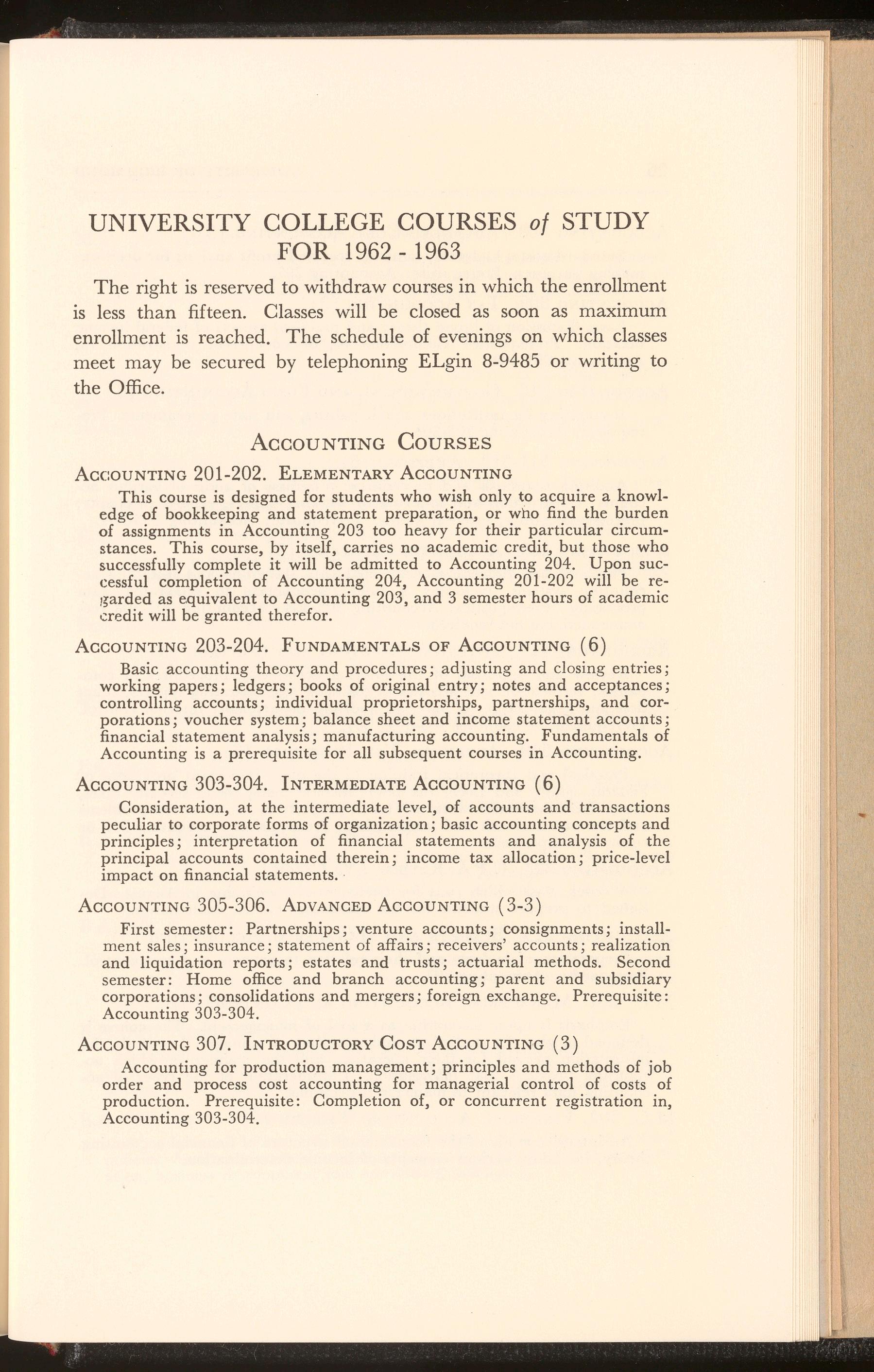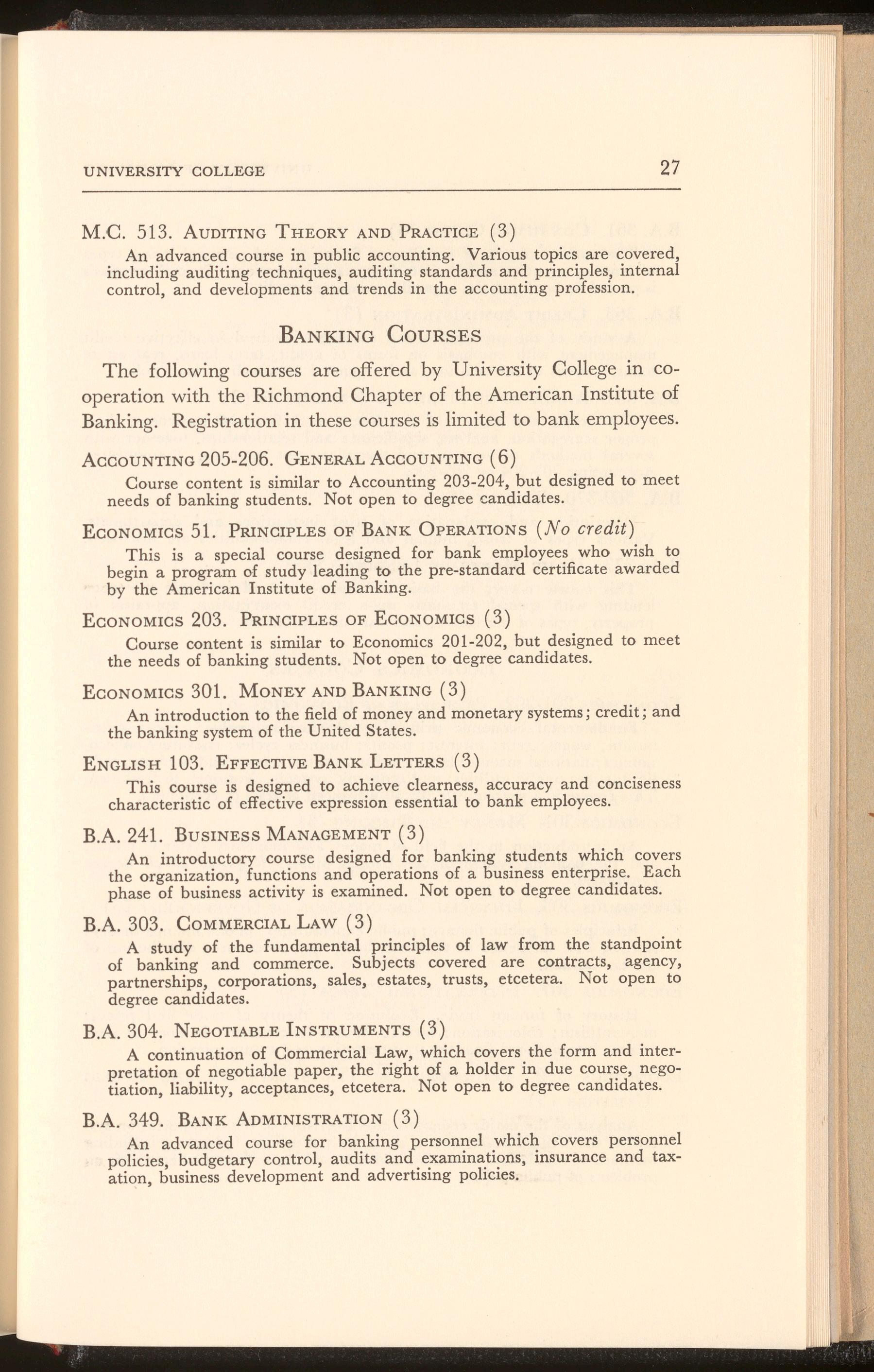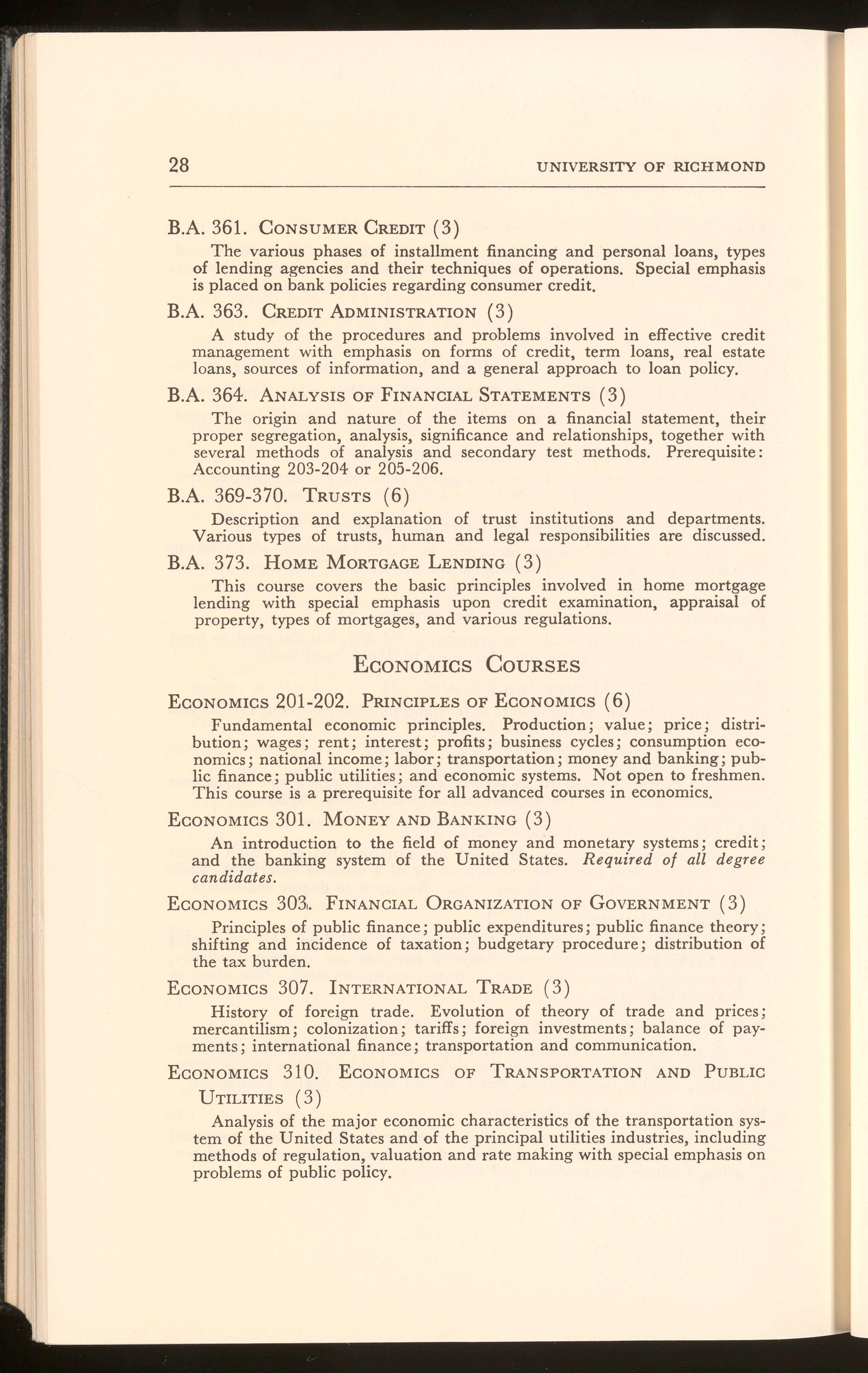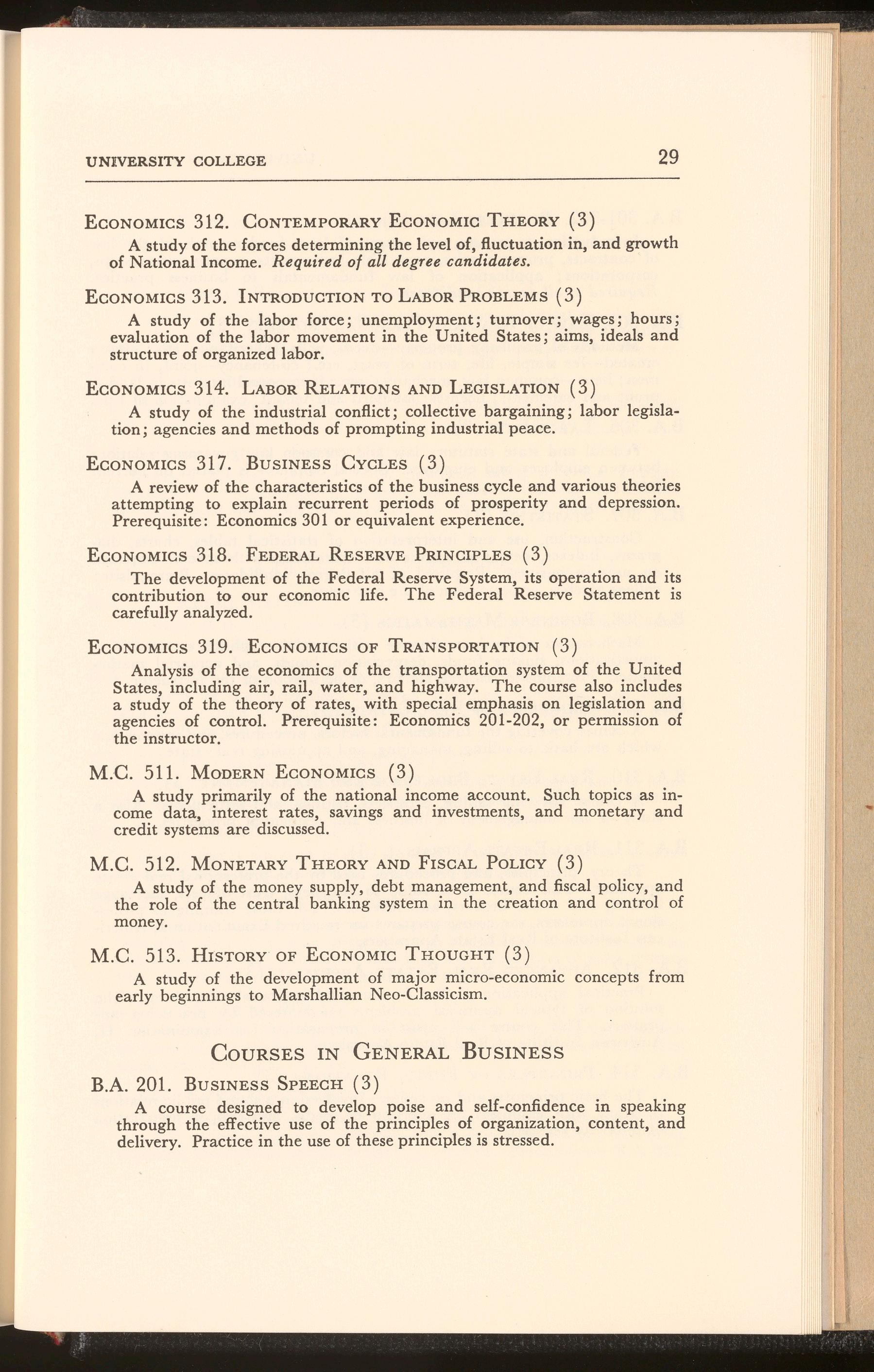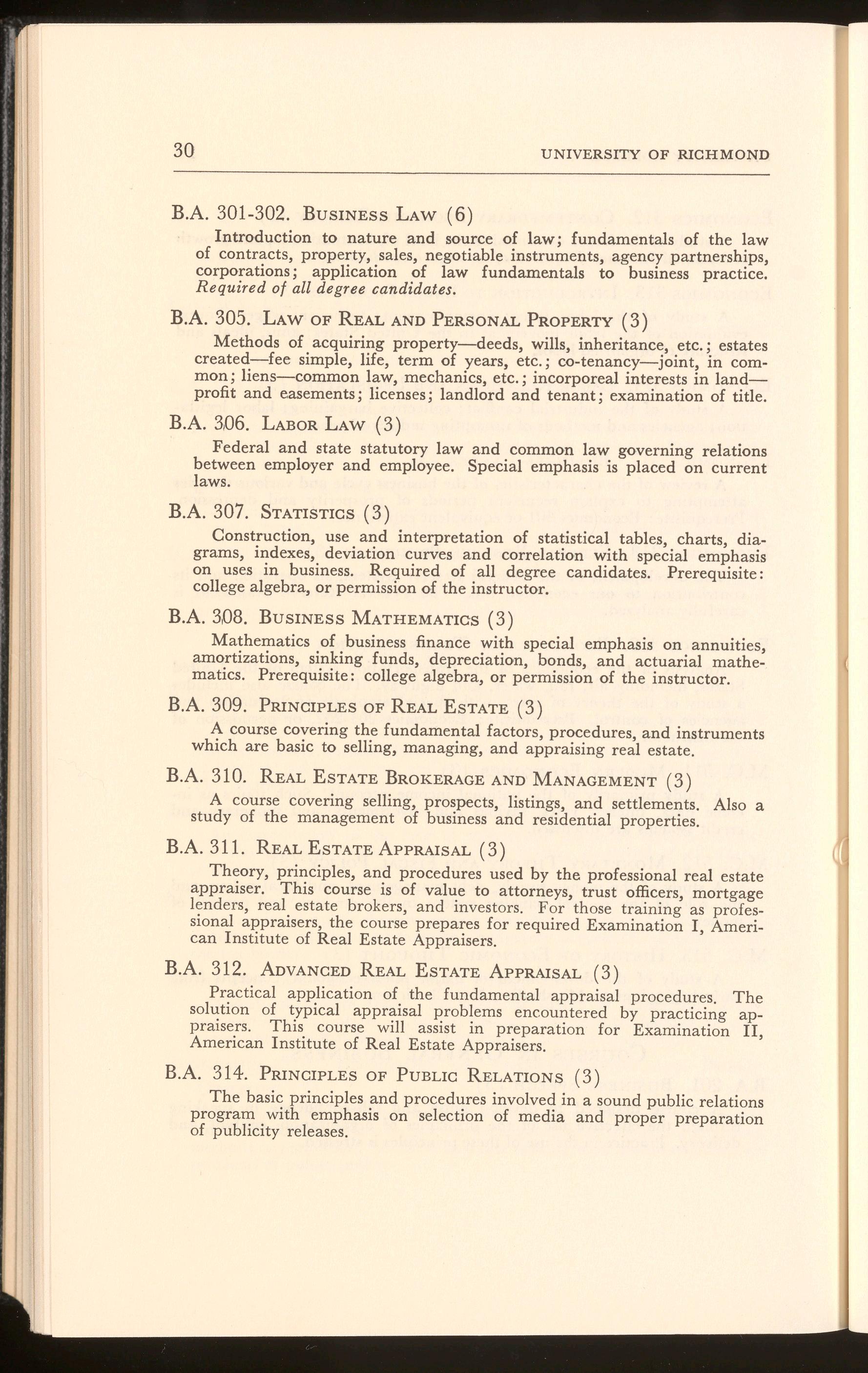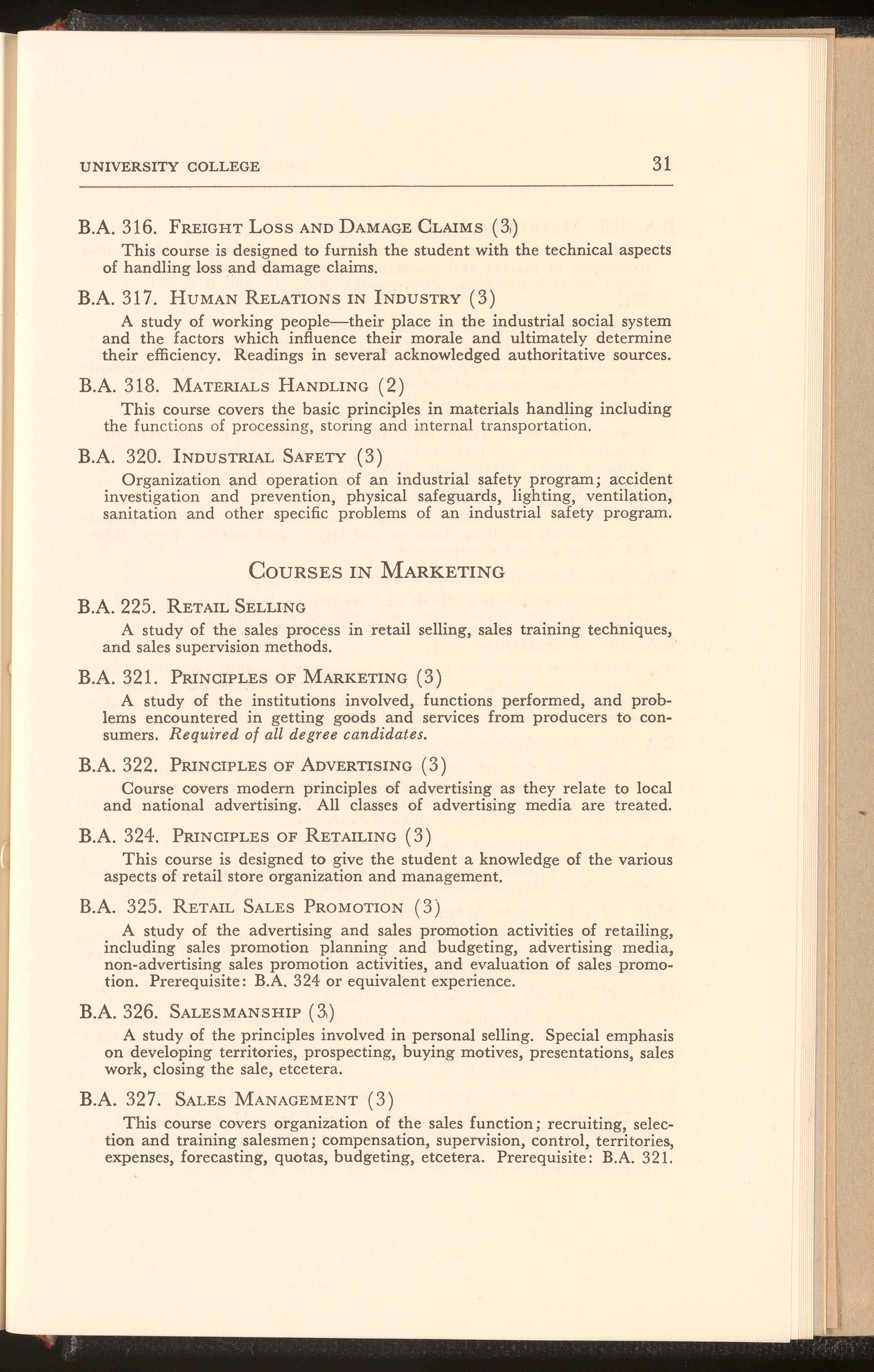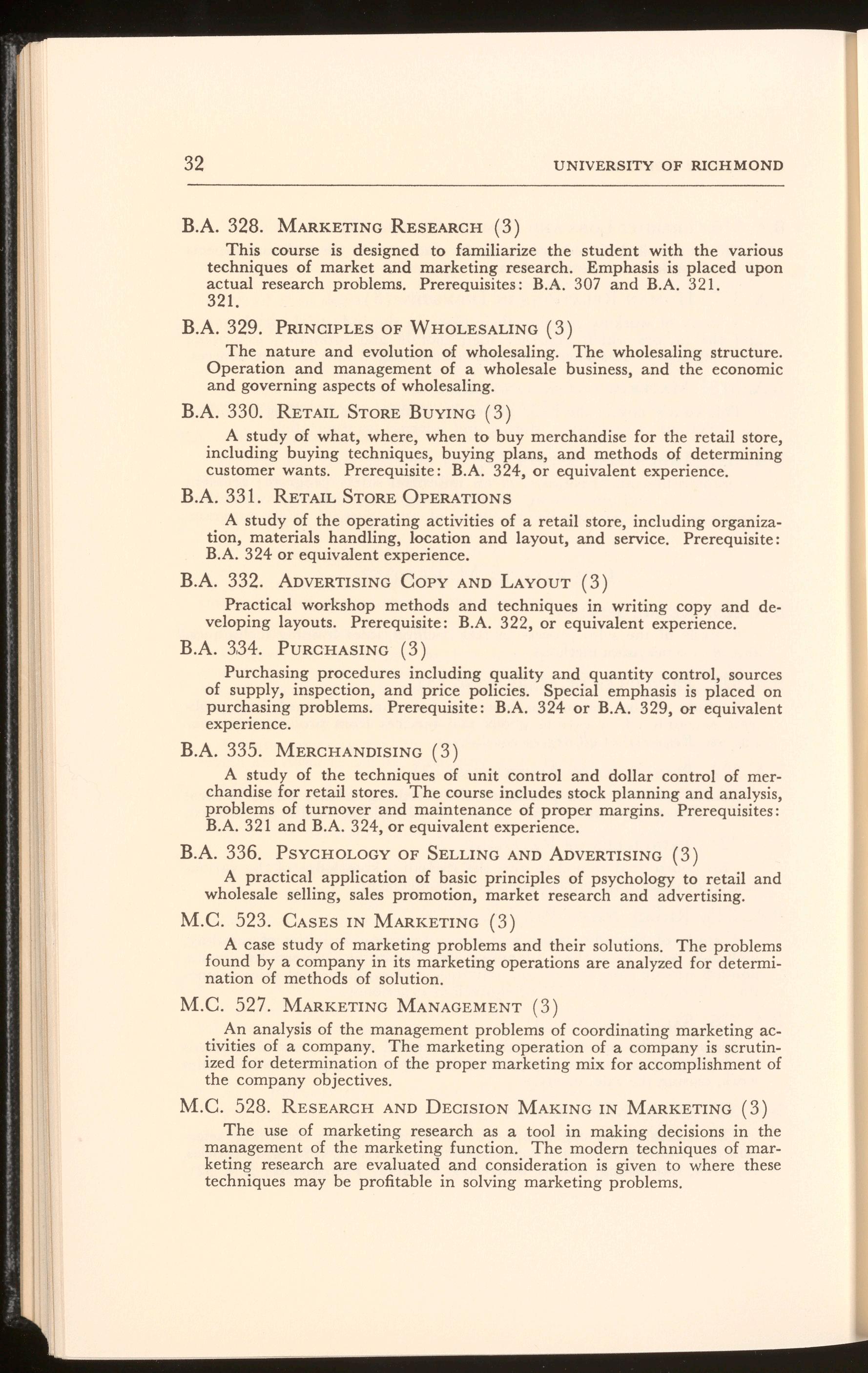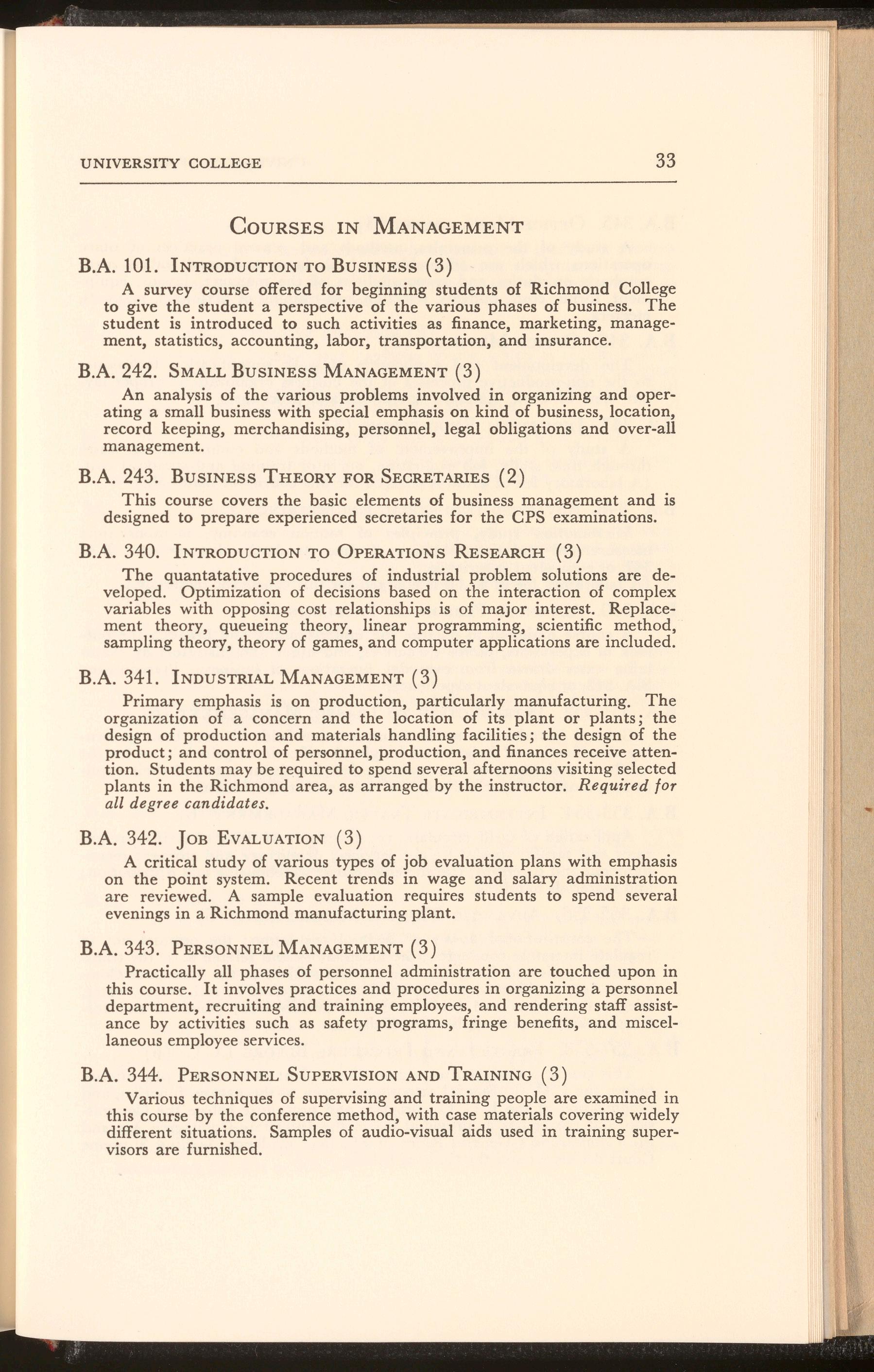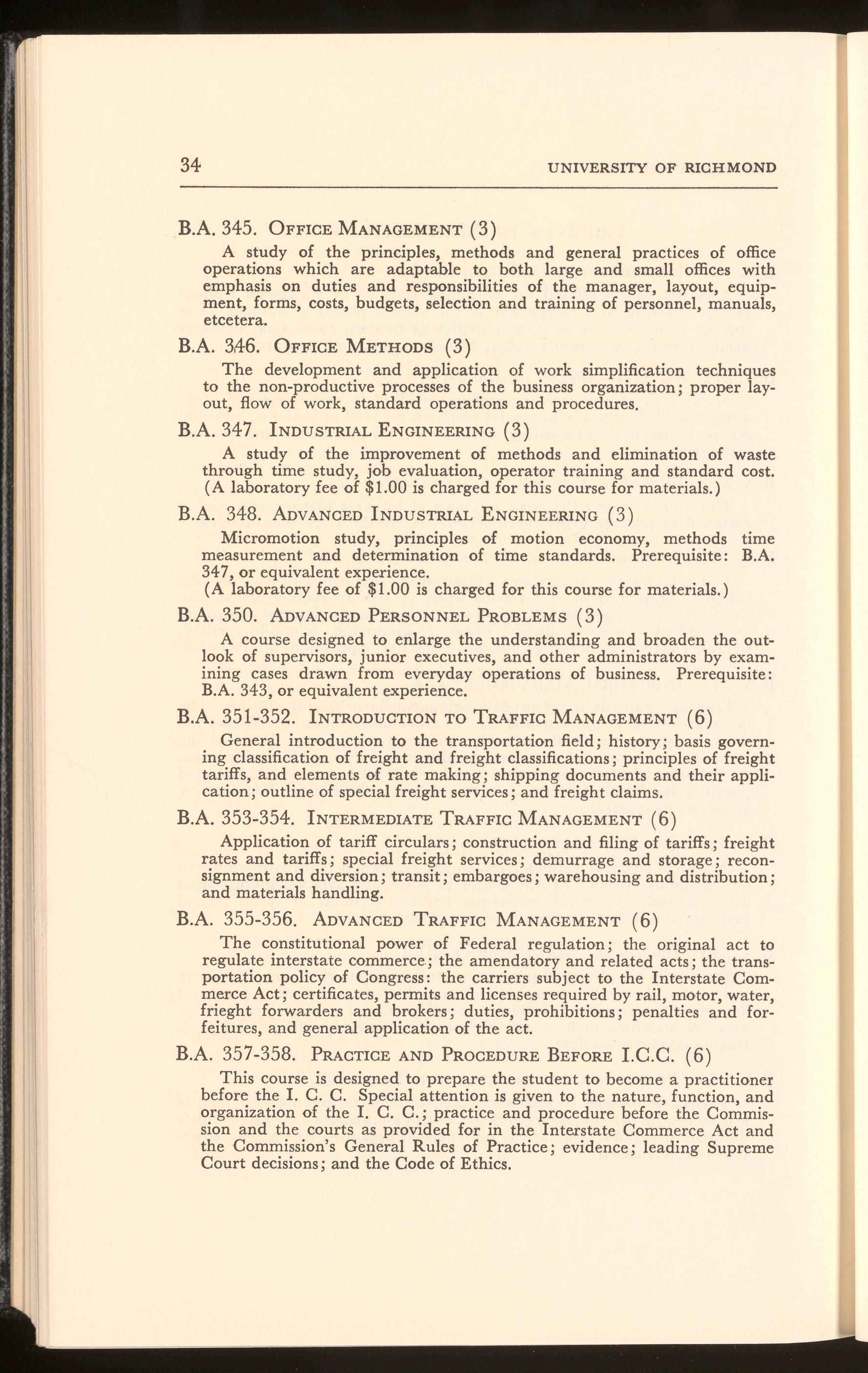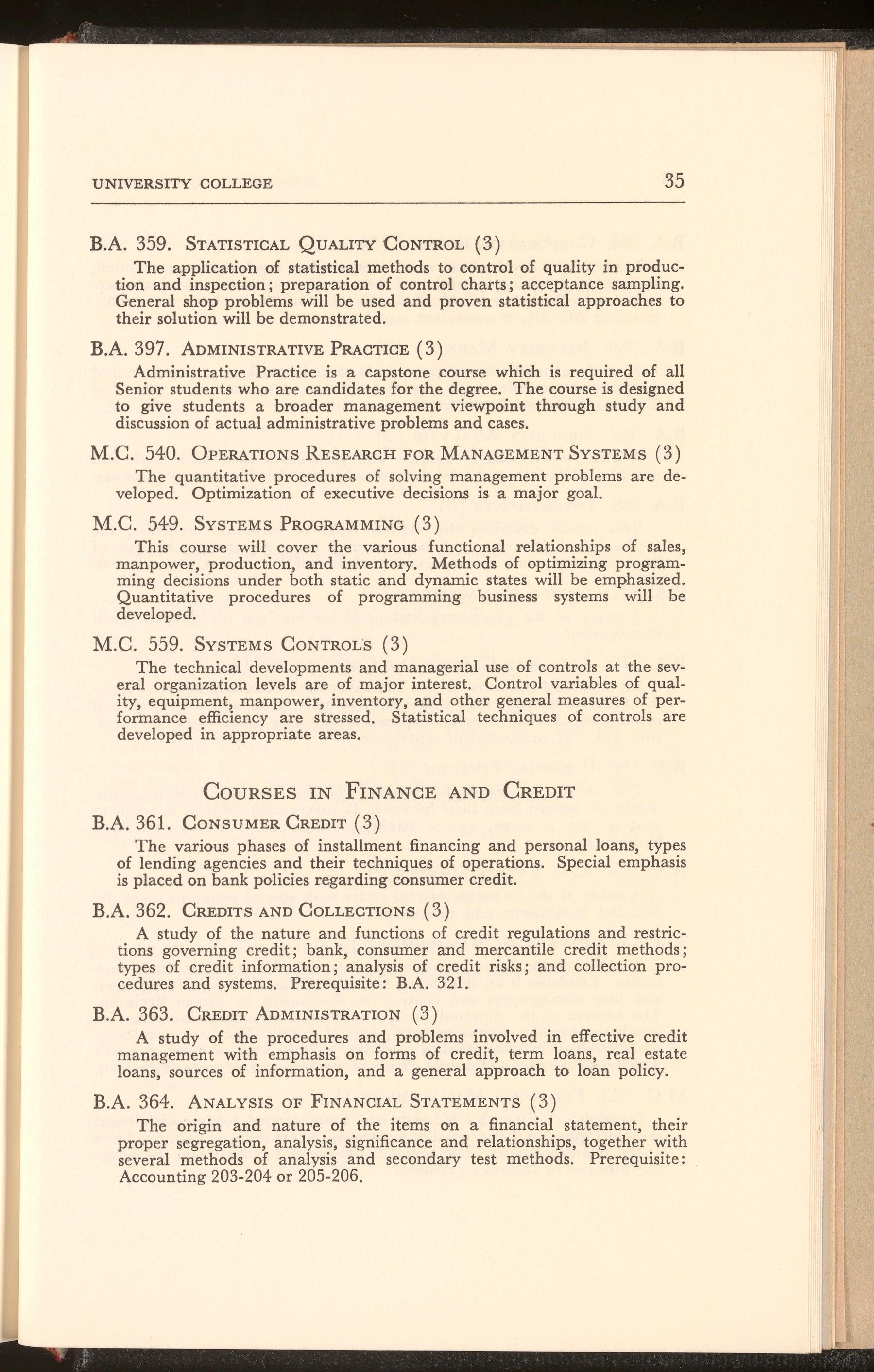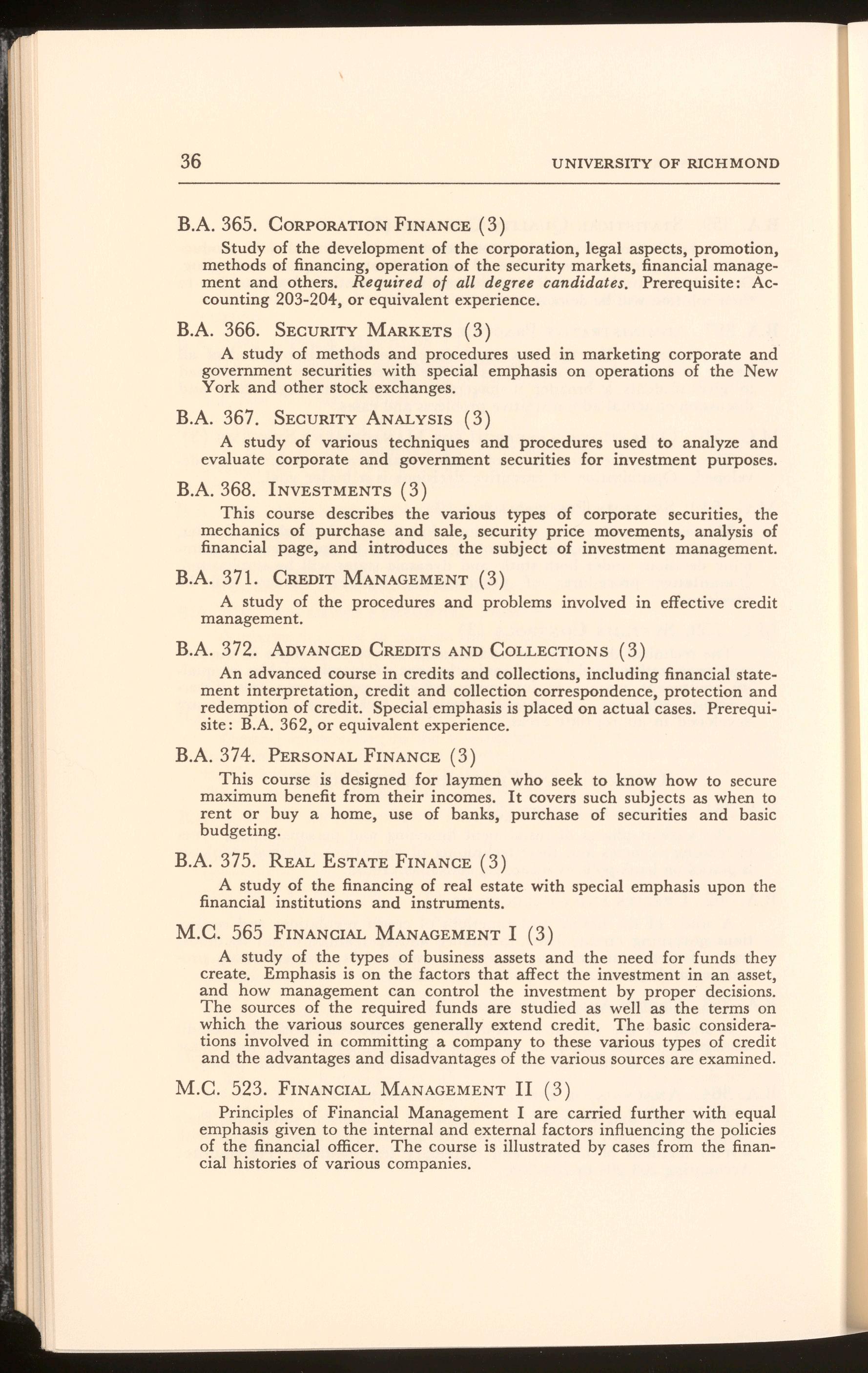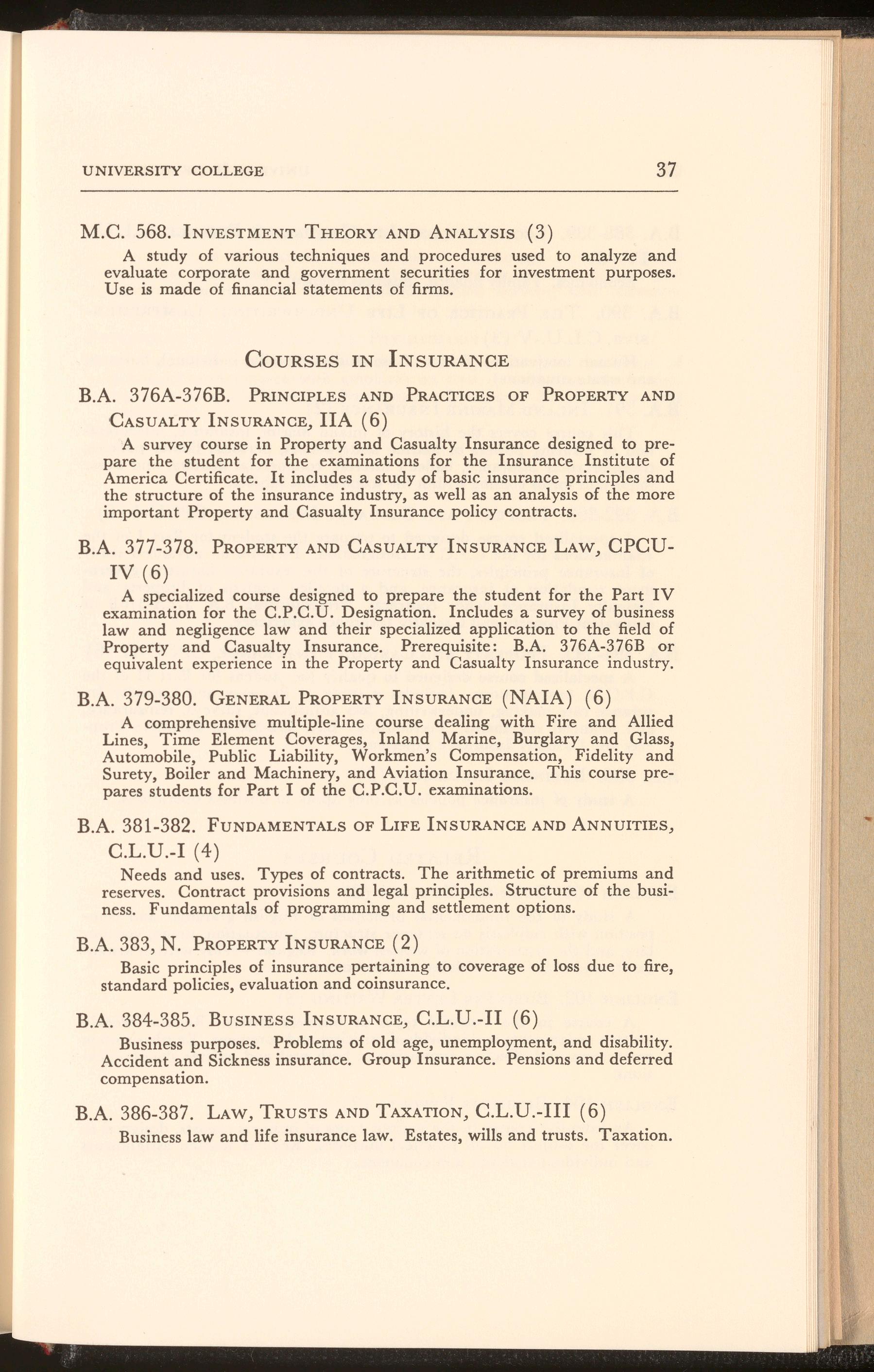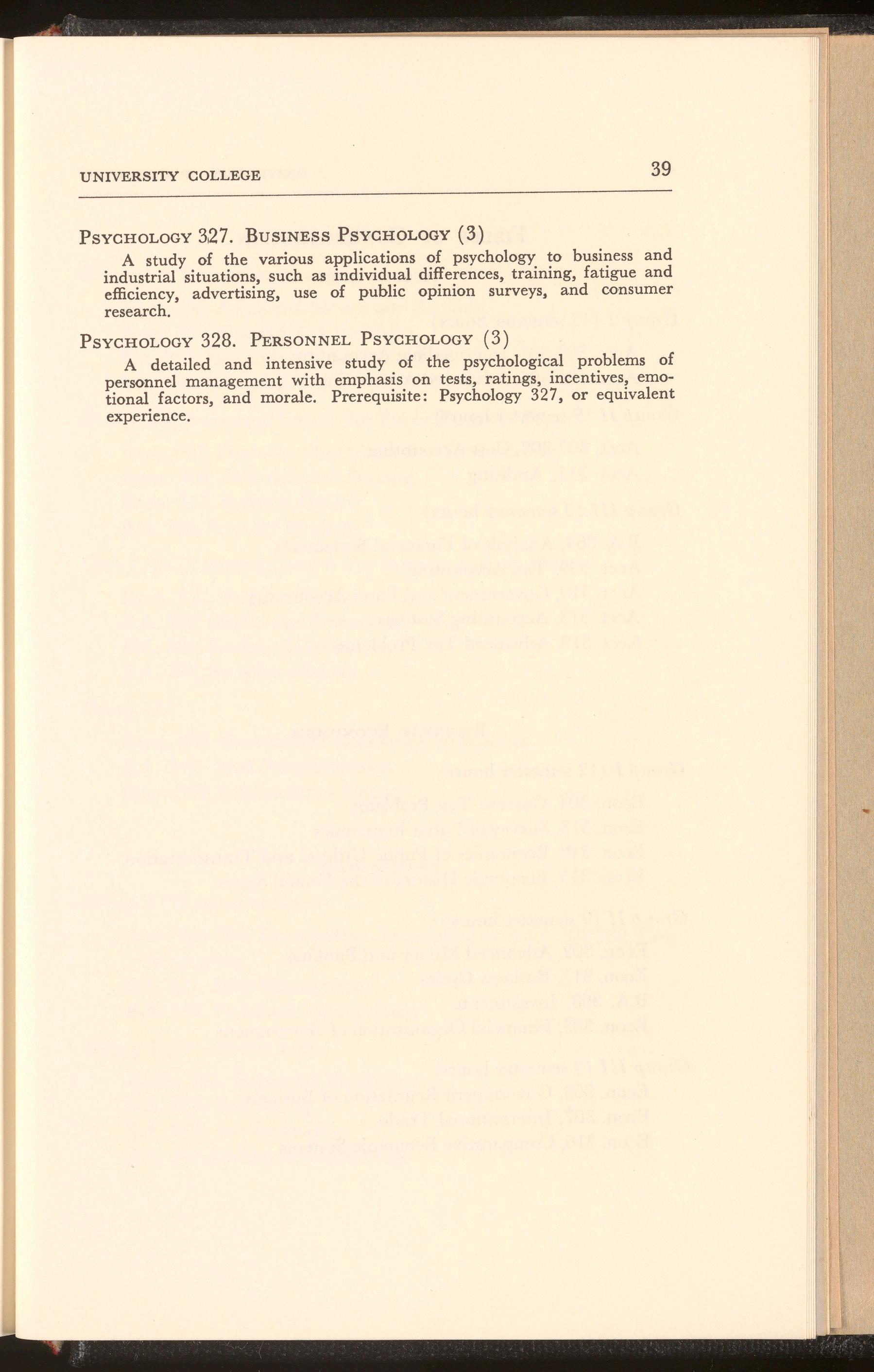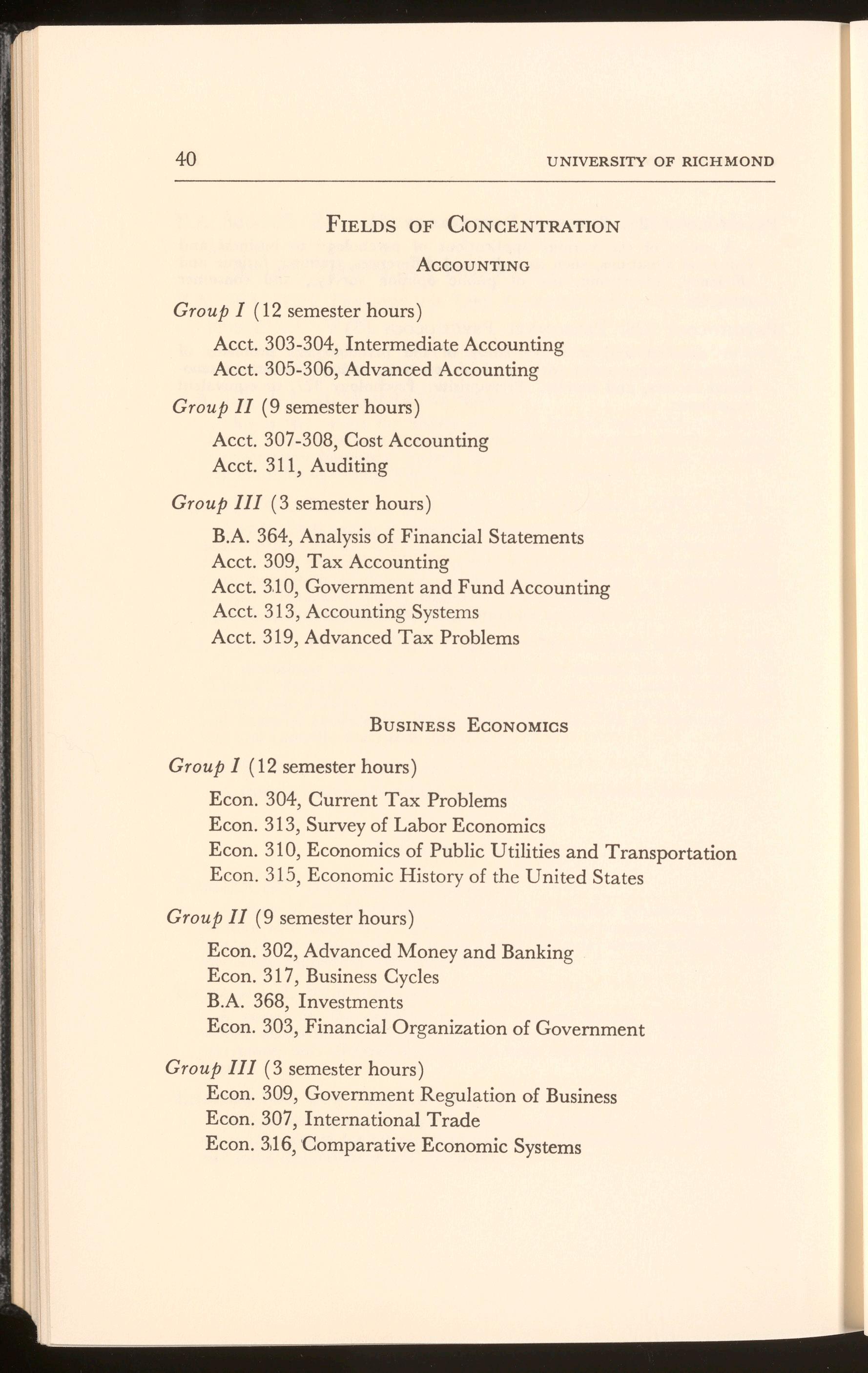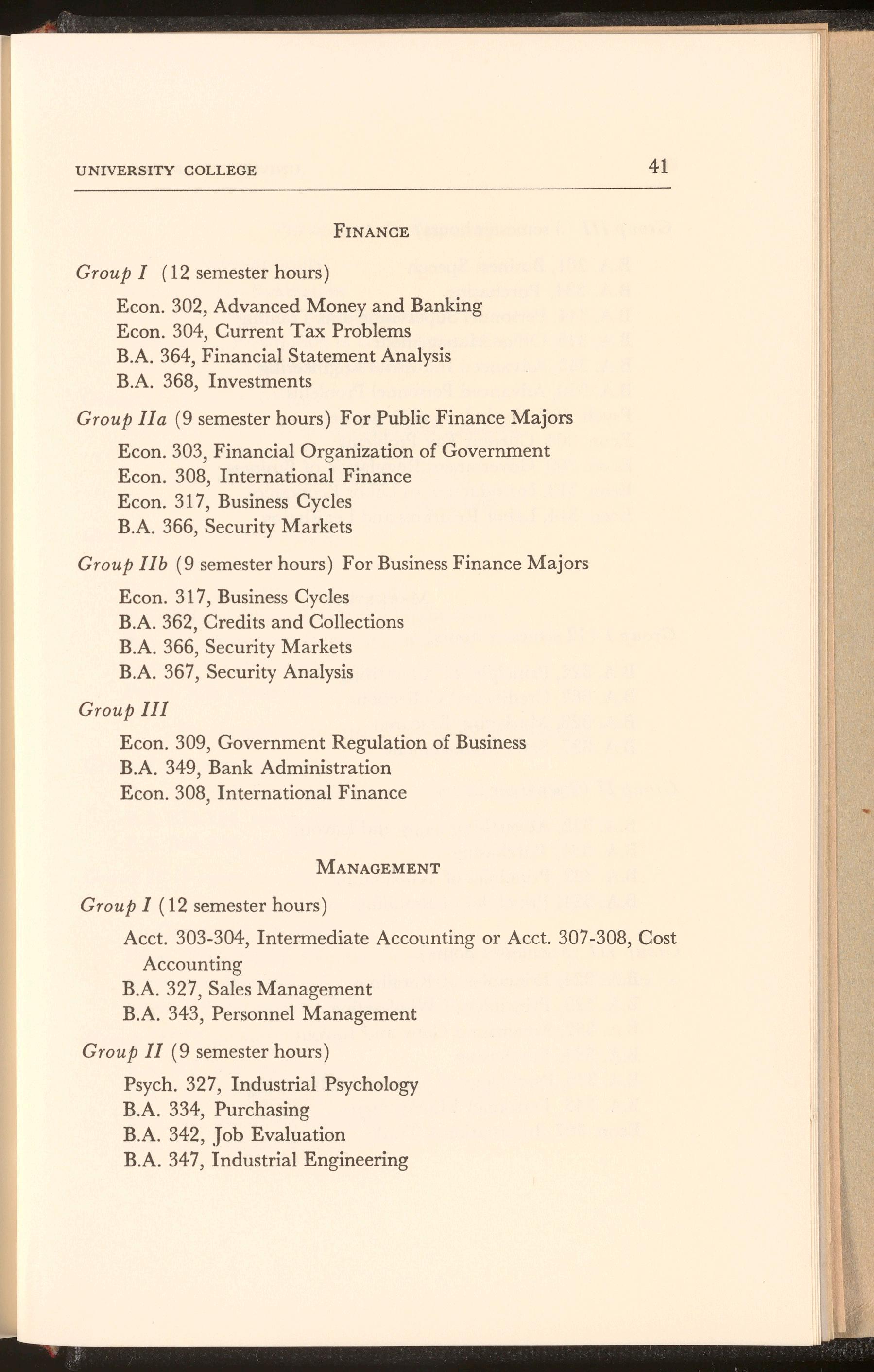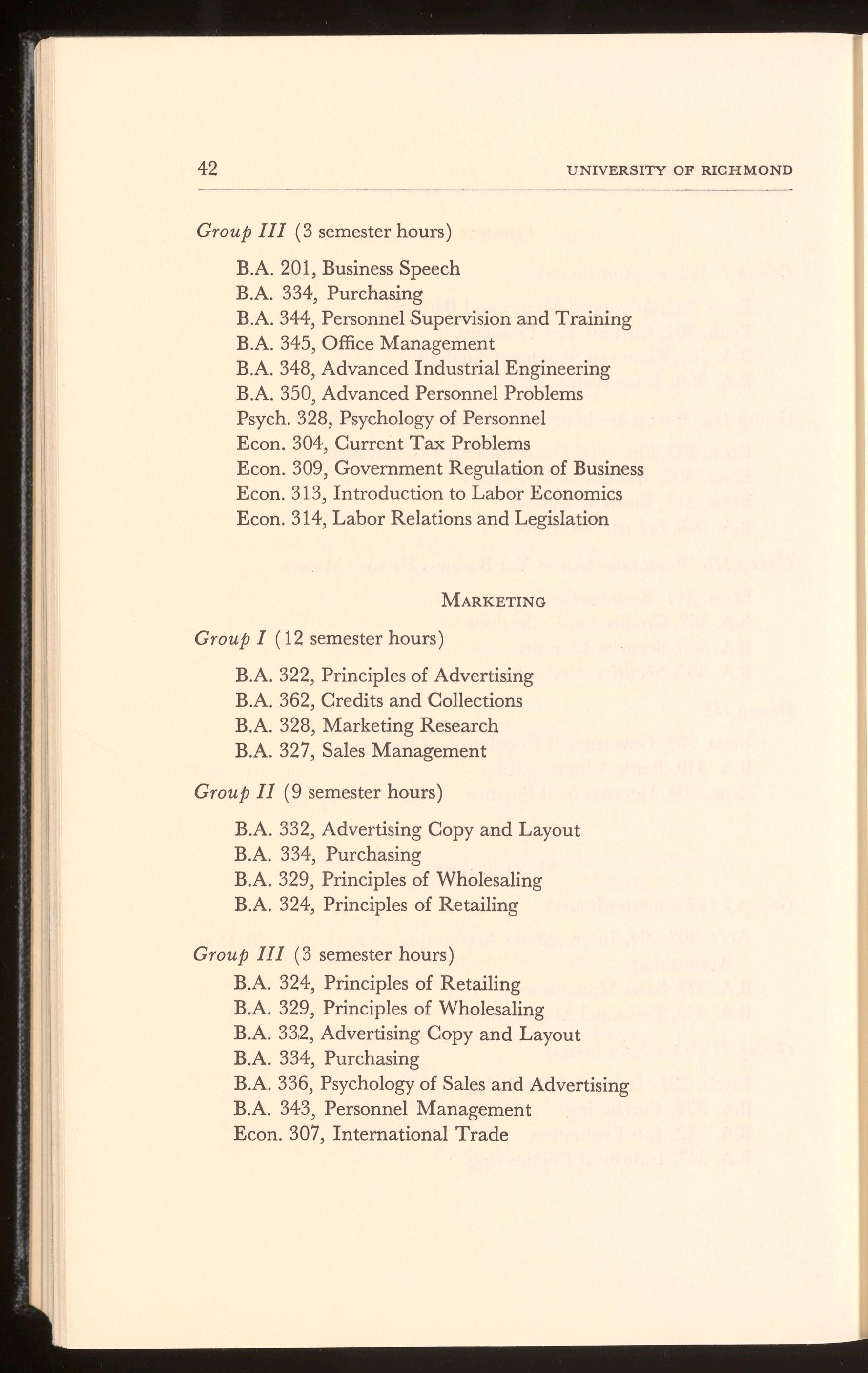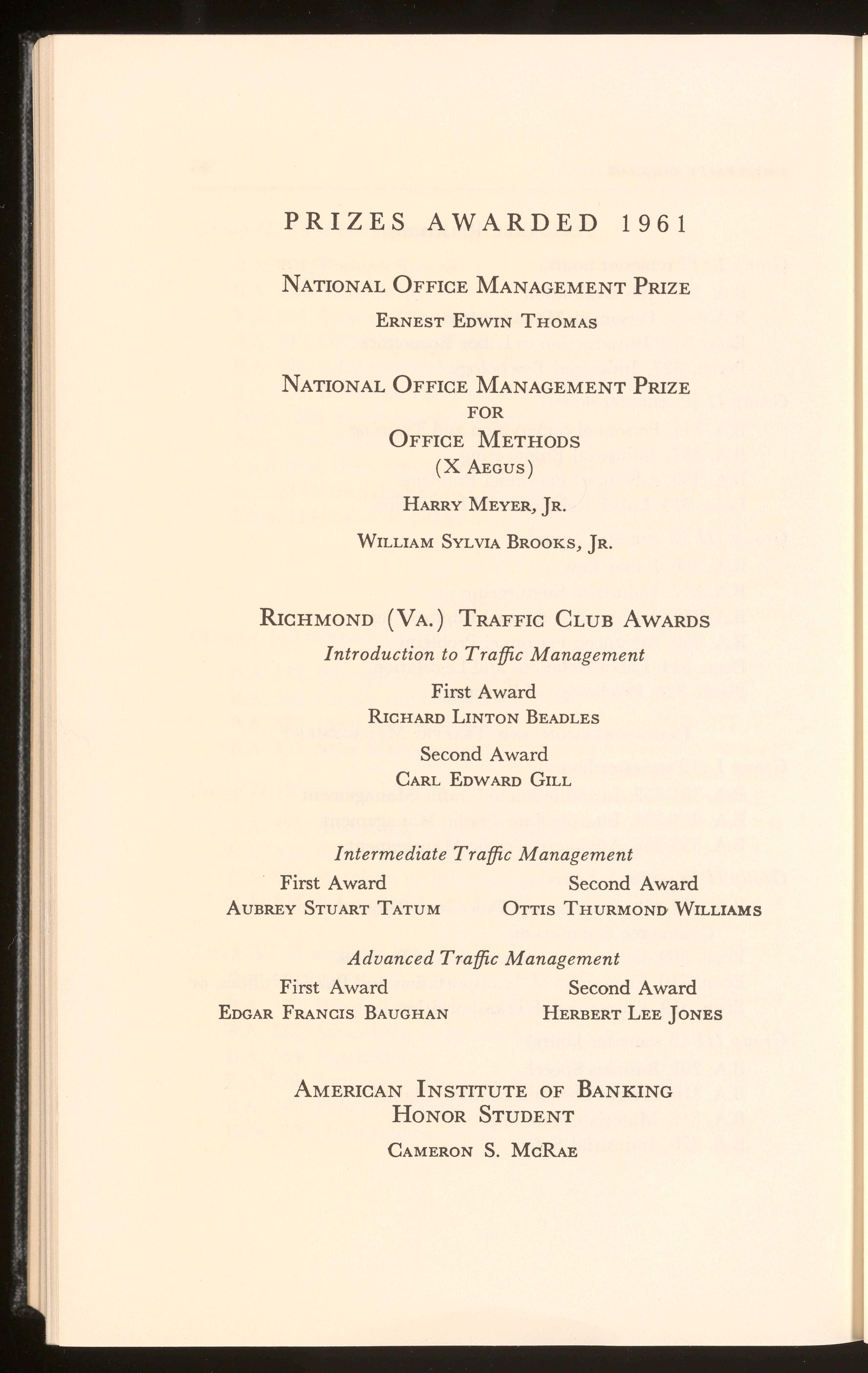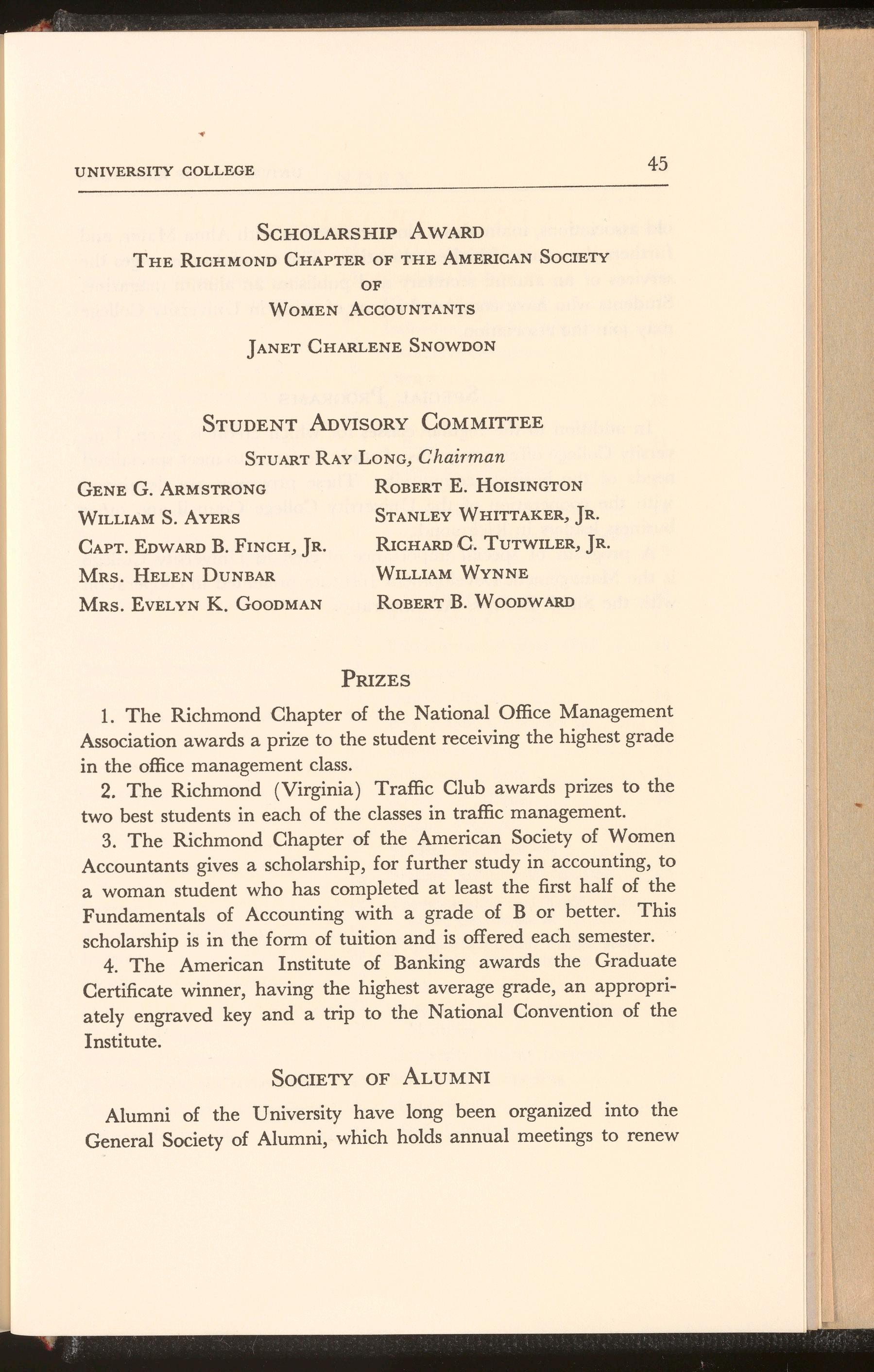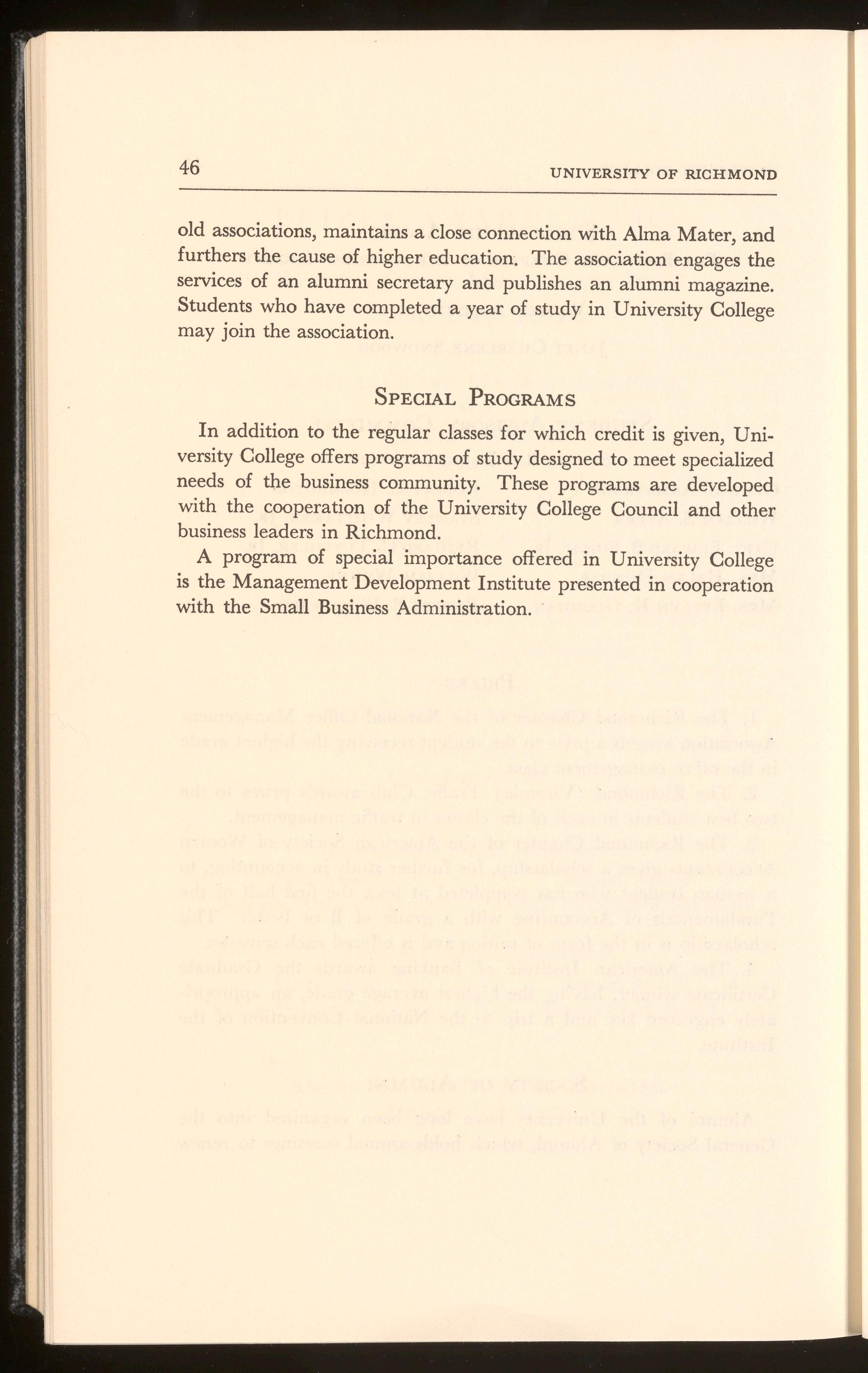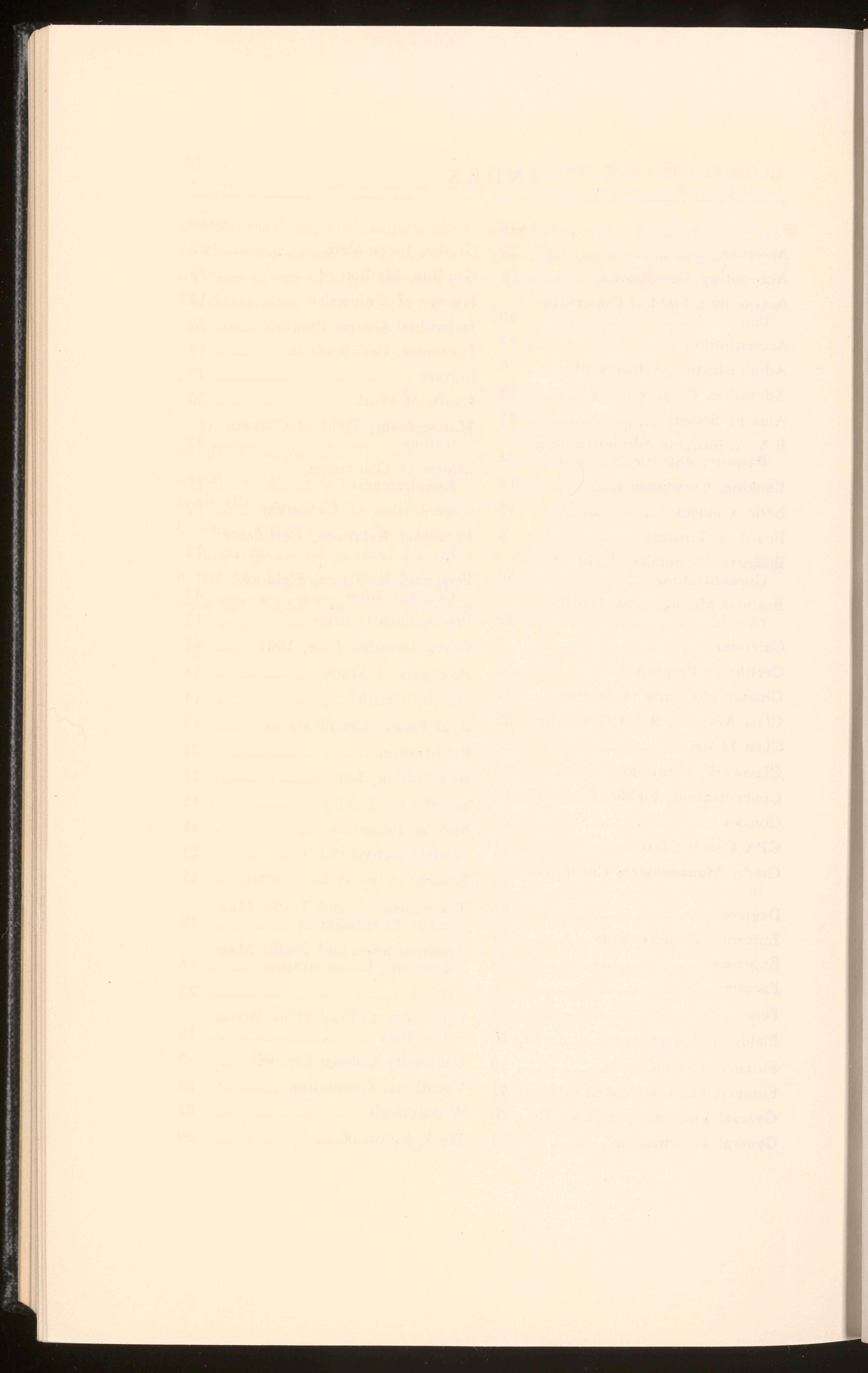UNIVERSITYCOLLEGE
LECTURERS
BEN E. AMES, B.S.
Personnel Manager, Thalhimer Brothers, Inc.
LINWOODM. ARON, B.A
Area Supervisor General Business
Executive Vice-President, Rountrey and Associates
E. BALLARDBAKER,LL.B
Partner, Wicker, Baker and Shuford
HENRY BONO, B.S.
Group Supervisor, Internal Revenue Service
DONALDBOYES, B.A., M B.A.
Area Supervisor, Transportation Reynolds Metals Company
BERT E. BRADLEY,JR., Ph.D.
Associate Professor, University of Richmond
WILLIAMB. BRENNAN,B.A. 7 Management Real Estate Appraisal Business Law Accounting Traffic Management Effective Speaking Office Management
Auditor of Receipts, The Cheasapeake and Potomac Telephone Company of Va.
!RvIN L. BRITTLE,B.A., C.P .A . Accounting Partner, J. C. Wheat & Co.
WALTERE. BURNETTE,B.A , M.B.A. Consumer Credit
State-Plant ers Bank of Commerce and Trusts
FRANK CHAPMAN,B.S., M.B.A.
Assistant Cashier, State-Planters Bank of Commerce and Trusts
Economics
RICHARDC. CAVENDISH,B.A. Industrial Management
Area Supervisor, Management Chief Industrial Engineer, Albemarle Paper Manufacturing Co.
BENJAMIN T. CULLEN, JR., M.A. Personnel
Personnel Director, Medical College of Virginia
WILLIAMV . DANIEL,B.A. Effective English
Assistant Cashier, First and Merchants National Bank
CARLEE. DAVIS,B.A., LL.B., C .P .A. Accounting Partner, McGuire, Eggleston, Bocock and Woods
SAMUELA. DERIEUX,B.S., C.P.A. Accounting Derieux and Watson
J. s. DORTCH, A.B., LL.B. Freight Claims
The Chesapeake and Ohio Railway
CLARENCEB. DRINKARD;JR., B.C S. Accounting Partner, Dalton & Drinkard
RICHARDC. EDMUNDS,JR., M.B.A. Management
Sales Manager, A. Reeves Barber & Beauty Supply Co., Inc
WILLIAMC. FARMER,B.A., C.L.U.
Agent, Shenandoah Life Insurance Company
RIVES FLEMING,B.S.
Insurance
Real Estate Finance
Branch Manager, First Federal Savings and Loan Association
CHARLES B. FRALEY,B.S.
Agent and Manager, Casualty Department, Tabb, Brokenbrough and Ragland Insurance Agency
ROBIN A. FRAYSER
Promotion Manager, Richmond Newspapers, Inc.
RICHARDS. GILLIS, B.A.
Director of Activities, Virginia State Chamber of Commerce
JOHN F. HABIG,B.S., M.B.A.
Area Supervisor, Marketing
Insurance
Marketing
Public Relations
Marketing
Consumer Market Research Specialist, Reynolds Metals Company
FRANCISA HALDA,M.A.
Accounting
Vice-President and Controller , Richmond Engineering Company, Inc.
J. C. HARLAN,B.A., M.A.
State-Planters Bank of Commerce and Trusts
JAMES D. HAWKINS, C.L.U.
Credit Administration
Life Insurance
Production Supervisor, Provident Mutual Life Insurance Co.
JOHN A. HENRY, B.S
Industrial Engineering
Superintendent, Albemarle Paper Manufacturing Company
RUDOLPHG. HETZER,B.S.
Promotion Manager, Owens, Minor and Bodeker, Inc.
w. LEROY HOERTER, B.A. Partner, Lindsey and Company
L. GEORGEHOOVER,B.S., C.P.A.
Accountant, Leach, Calkins and Scott
M. R. IRBY, M.S.
J. C Wheat and Company
JULIAN IRVIN, B.A., C.P.A.
Area Supervisor, Accounting Partner, Hardy and Irvin
CECIL F. JONES, B.S., M.S., C.P .A. Auditor, University of Richmond
WALTER L. Juno, B.A.
Area Supervisor, Retailing
Personnel Manager, Sears, Roebuck and Company
GODFREYE. LAKE, B.S.
President, Lake Brokerage Company
UNIVERSITY COLLEGE
CHARLES w. LAUGHLIN, A.B., LL.B.
Commercial Law Associate, Christian, Barton, Parker and Boyd
RoBERT J. LECHNER, C.P.A.
Accounting Mitchell, Wiggins and Company
JOHN A. LEPP, B.S., C.P.A.
Accounting Partner, Leach, Calkin & Scott
LAURENCE H. LEVY, A.B., M.B.A.
Business Management Vice-President and Treasurer, Modern Woodwork, Inc.
J. E. LUECKE, B.A., C.P.C U.
Insurance Underwriting Manager, Kemper Insurance Company
DONALD MACDONALD, M.E.
Management Retired-Southern Manager Public Relations, DuPont Company
Gus D. MANDALERIS, B.S., C.P .A.
Accounting Staff Auditor, Andrews, Burket and Company
G. H. MAYES, B .A.
Assistant Title Officer, Lawyers Title Insurance Company
EMMANUEL 0. MELICHAR, Ph D.
Associate Economist, Federal Reserve Bank
NATHAN METZGER, C.L.U
General Agent, Union Mutual Life Insurance Company
JOHN M. MILLER, IV
Insurance
Economics
Insurance
Credit Administration
Assistant Vice-President, First and Merchants National Bank
MILTON P MILLER, B.S., LL.B. Attorney, Private Practice
HARRY MURRAY, B.B.A., C.P.A. Partner, Harry Murray and Company
JosEPH E. NETTLES
Real Estate
Accounting
Public Relations Director of Public Relations, University of Richmond
GEORGE NICHOLS, M.A., Ph.D.
Money and Banking Area Supervisor , Economics Industrial Development Commission, State of Virginia
JoHN L NosKER
Bank Administration
Assistant Vice-President, Federal Reserve Bank of Richmond
JACK M. PARRISH, B.S
Credit Management Concrete Pipe and Products Co., Inc.
JAMES PARTHEMOS, M.A.
Economics Associate Economist , Federal Reserve Bank of Richmond
KENNETH M. PEDERSEN, B.S.
Accounting Partner, Baker, Brydon, Rennolds and Whitt
UNIVERSITY OF RICHMOND
CHARLES H. PHILLIPS, JR., B.S., M.B.A. Real Estate Morton G. Thalhimer, Inc
w. JERRY ROBERTS, LL.B. Business Law Partner, White, White and Roberts
WILLIAM L. RocK, C.P.A. Analysis of Financial Statements Staff Accountant, Leach, Calkins & Scott
THOMAS C. SANDERS, B.A., M.B.A., Ph.D. Statistics Economist, Federal Reserve Bank of Richmond
JULIAN E. SAVAGE, LL.B. Business Law Partner, Rogers, Cudlipp and Savage
WILLIAM C. SCHMIED, B.A. Banking Assistant Cashier, Central National Bank
WILLIAM G. SHANNON Salesmanship Assistant Manager, Personnel and Public Relations, Esso Standard Oil Company
WILLIAMS. SMITHERS, LL.B. Business Law Private Law Practice
WALLACE STETTINIUS, M.B.A. Finance Analyst and Representative, Anderson and Strudwick
w. N. STREET, B.S. Business Administration Assistant Vice-President, State-Planters Bank of Commerce and Trwts
WELFORD D. TAYLOR, M.A. English Instructor in English, Richmond Professional Institute
F. CARLYLE TILLER, B.A., M.B.A. Investments General Partner, J. C. Wheat and Company
JAMES L. TOMPKINS, B.S. Transportation Traffic Manager, Virginia-Carolina Chemical Corporation
WALTERD. TUCKER, B.S. Accounting Credit Analyst, State-Planters Bank of Commerce and Trusts
JOHN TYLER, JR., B.S. Fundamentals of Banking Assistant Cashier, First and Merchants National Bank
WILLIAM H. WARREN, M.S. Personnel Relations Supervisor, Employee Relations, Albemarle Paper Manufacturing Co.
BERNARD L. WEBB, B.S. Property Insurance Area Supervisor, Insurance Executive Secretary, Insurance Advisory Committee
DIETER H. WEISS, A.B., M.B.A. Accounting Accountant, Mitchell, Wiggins and Company
GEORGE F. WHITE, JR., B.S. Management Director, Package Process Development, Reynolds Metals Company
UNIVERSITY
JOSEPH H. WILKINS, JR., B.C.S., C.P.A.
Accounting Private C P.A. Practice
DONALD WILLCOX, B.A., M.B.A.
Economics Trust Officer, State-Planters Bank of Commerce and Trusts
JACK A. WILLIAMS
Traffic Management Assistant Director of Traffic, Reynolds Metals Company
w. B. WILTSHIRE
Credits and Collections Secretary and Ass't Treasurer, Benjamin T. Crump Company, Inc
w. ROBERT WOERNER, A .B.
Accounting Accountant, Reynolds Metals Company
WILLIAM H. WoLFE, JR., B.S.
Accounting Partner, Maddrea, Fergusson and Woody
NORMAN w. WORTHINGTON, B.S.
Purchasing Research Director, Miller & Rhoads
THOMAS C. YEAMAN, B.A.
Economics Staff Supervisor (Accounting Department}, The Chesapeake & Potomac Telephone Co.
General Information
ORGANIZATION
University College, formed in 1962, is the newest division of the University of Richmond. The origin of University College may be traced back to 1920 when the department of economics of Richmond College was formed, eventually to become the department of economics and applied economics. In 1924 the Evening School of Business Administration was organized as a separate division of the University of Richmond. In 1949 the department of economics and applied economics in Richmond College was combined with the Evening School of Business Administration to form the School of Business Administration with both day and evening classes. In 1962, the Evening Division was separated from the School of Business Administration to become the University College This new college is one of seven divisions of the University of 'Richmond.
The University of Richmond was founded and is supported by the Baptists of Virginia. Other divisions with dates of founding are Richmond College ( 1830) ; The T C. Williams School of Law (1870); Westhampton College (1914); the Summer School (1920); the Graduate School ( 1921) ; and the School of Business Administration ( 1949). Each College has its own dean, its own faculty, and its own institutional life. The University Senate, on which sit representatives of all the faculties, provides for intercollegiate cooperation.
The University of Richmond , one of the twenty-one affiliated institutions of the University Center in Virginia, benefits from the several cooperative programs operated by the Center Through a cooperative Evening Program students can complete all requirements for an undergraduate degree in Business Administration or a graduate degree in Commerce.
LIBRARY FAGILITIES
The libraries of the University contain over 150,000 volumes. The main collection is housed in the new Boatwright Memorial Library .
Special collections of books, pamphlets and research materials are maintained by the Richmond Chapter of the Virginia Society of Certified Public Accountants, the Richmond Chapter of the National Office Management Association, and the Richmond Chapter of the American Institute of Banking.
CLASSROOM FACILITIES
Most classes in University College are held m the Columbia Building, located at 601 N. Lombardy Street. Many classes are offered in the new building of the School of Business Administration on the main campus of the University.
AccREDITATION
University College is part of The University of Richmond which is fully accredited by the Southern Association of Colleges and Schools.
ADMISSION REQUIREMENTS To UNIVERSITY COLLEGE
Four classifications of students, both men and women, are admitted to University College.
( 1) Special students . Adults over twenty-one years of age who are not high school graduates may be admitted as special students.
(2) High school graduates. Young men and women who have graduated from high school with at least fifteen approved units are eligible to enter.
(3) Present or former college students. To those young people who have attended college a year or more without graduating, University College offers an opportunity to continue their university training while being employed.
( 4) College graduates. Many students enrolled in University College are college and university graduates. Graduates of liberal arts colleges who wish to extend their general education, graduates of engineering colleges who wish to supplement their technical knowledge, and graduates of university schools of commerce who wish to specialize further in particular fields of activity, have found
UNIVERSITY
benefit in the training provided. College graduates can also obtain credits leading to the degree Master of Commerce.
Veterans of the armed services, whether high school graduates or not, who demonstrate their ability to undertake college work may enter University College. Most veterans will be eligible for educational benefits under the G. I. Bill.
PROGRAMS OF STUDY
Degree Program - Work done in University College is of full college grade and is accepted toward a degree in the University of Richmond or other colleges and universities. To receive college credit a student must meet the college requirements for entrance, must attend classes regularly, and must pass the examinations at the end of the semester. For every course passed each semester, two or three semester-hours credit is given.
BACHELOR OF SCIENCE IN BUSINESS ADMINISTRATION
The degree of Bachelor of Science in Business Administration is awarded to either men or women by the University of Richmond for a course of study completed in University College according to the following requirements:
The student may become a candidate for the degree of Bachelor of Science in Business Administration from University College after he has completed 45 semester hours with 45 quality credits by making application to the Dean of University College. A total of 124 semester hours of work and 120 quality credits are required for the degree. At least 60 semester hours of approved courses must be passed with credit at the University of Richmond; and at least 45 of these sixty Semester hours must be selected from the curriculum offered by this school. The student is limited to no more than five failing grades in business courses. Quality credits are calculated from academic hours on the following basis: each semester hour passed with Grade A shall count three quality credits; with Grade B, two quality credits; with Grade C, one quality credit; with grade D, no quality credit.
Pre-Business Courses
The following liberal arts courses must be completed by each student:
Each student is required to pass with a grade of no less than C each of the following courses:
Field of Concentration
Upon entering the degree program the student must choose a field of concentration. Possible fields of concentration include accounting, finance, marketing, management, business economics, personnel and traffic management. A grade of no less than C must be earned in each course and at least 24 hours must be offered in the field of concentration. See page 40 for fields of concentration. Before making his selection, the student should confer with the Dean of the School or department adviser.
* A _grade of at least a C must have been earned on the Principles of Economics.
MASTER OF SCIENCE IN BusINESS ADMINISTRATION
The degree of Master of Science in Business Administration is awarded to either men or women by the University of Richmond Graduate School for a course of study completed in University College according to the following requirements:
A candidate for the degree of Master of Science in Business Administration must complete twenty-seven semester hours of work in graduate or advanced undergraduate courses which must include Business Administration 598-599 ( Graduate Seminar in Business) and one other 500 level course, plus the master's thesis for which the candidate must register in the thesis course, B.A. 590. Effective in and after September, 1962, no scheduled advanced undergraduate courses will be offered in partial fulfillment of the requirements for the Master of Science in Business Administration degree nor will Business Administration 598-599 be offered. Students who previously were working toward this degree may elect to register for and substitute any of the new graduate courses in fulfillment of the requirements of the Master of Science in Business Administration degree. No credit will be given for courses in which the student has a grade lower than B. In addition, a candidate for the Master of Science in Business Administration degree will be required to complete the Basic Business Courses with a grade of at least C, and must complete the thesis.
A student desiring to complete the degree of Master of Science in Business Administration should confer with the Dean of University College or his authorized representative for specific information.
MASTER OF ARTS IN ECONOMICS
A prerequisite for a graduate major or minor in Economics is that the student shall have had, previously, at least as much work in the Department of Economics as is required of an undergraduate major or minor. Effective in and after September, 1962, no scheduled advanced undergraduate courses will be offered in partial fulfillment of the requirements for the Master of Arts in Economics. Students who previously were working towards this degree and elect to fulfill the requirements but who have not completed all of the re-
quired course work will be permitted to register for the new graduate courses in Economics and, upon special permission, for others in the new program.
For accepted students, the following are the minimum requirements for the degree of Master of Arts in Economics:
1. Twenty-seven semester hours of graduate courses, including a minimum of nine hours in a major field and eighteen hours to be divided between the major and minor field. A student desiring to complete the degree of Master of Arts in Economics should confer with the Dean of University College or his authorized representative.
2. A thesis in the major field.
3. A minimum grade of B in all courses counted toward the degree.
MASTER OF COMMERCE
The degree of Master of Commerce is awarded to either men or women by the University of Richmond Graduate School for a course of study completed in University College according to the following requirements:
A candidate for the degree of Master of Commerce must complete a minimum of thirty-three semester hours of work in the graduate ( 500) courses of the school. These thirty-three hours must be taken in three of the five fields of graduate specialization that have been designated; namely, economics, finance, industrial management, marketing and accounting. In addition, each student must complete six additional hours of approved graduate courses, selected in any combination from the two remaining fields of graduate work. No credit will be given for graduate courses in which the student has a grade lower than B.
Students will be required to submit as a prerequisite to candidacy the satisfactory completion of the basic business courses or their equivalent in education or business experience. Specifically, the basic courses are as follows: Principles of Accounting, Principles of Economics, Business Law, Principles of Marketing, Statistics, Corporation Finance, Money and Banking, Contemporary Economic Theory, Industrial Management, and Administrative Practice. Before regis-
UNIVERSITYOF RICHMOND
tering for graduate work under the Master of Commerce program, the student should confer with the Dean of University College or his authorized representative to determine which undergraduate basic business courses are to be required. Graduate classes will be composed of graduate students only. Persons who are not seeking a degree or certificate from the University of Richmond and who are otherwise qualified may enroll in a graduate course with special permission of the Dean or faculty advisers. All undergraduate courses are in the 200 or 300 series. All graduate courses carry the 500 series number and may be taken without regard to order.
CERTIFICATE PROGRAM
A certificate in Business Administration will be awarded to any student who has successfully completed, with a grade of no less than C in each course, 36 to 43 semester hours-depending on the program-of which at least 24 semester hours must have been completed in University College of the University of Richmond. Each program must be approved, prior to its completion, by the Dean of University College. Several certificate programs are offered
AccouNTING (42 semester hours)
First year: Second year:
Third year: Fourth year:
First year: Second year: Third year: Fourth year:
First year:
ACCOUNTING203-204, B.A. 301-302.
ACCOUNTING303-304, 309.
ACCOUNTING305-306, 307-308.
AccouNTING 311-312, 310.
BANKING (36 semester hours)
B.A. 303-304, 241.
EcoNOMics 203, AccouNTING 205-206.
EcoNOMICS 301 and 6 hours of electives.
Electives to complete 9 semester hours.
FINANCE (36 semester hours)
ACCOUNTING203r204, ENGLISH 101, ECONOMICS 201-202.
UNIVERSITY COLLEGE
Second year: Third year:
First year: Second year: Third year:
First year: Second year: Third year:
EcoNoMics 301, B.A. 301-302.
B.A. 365, 367, 368 and 3 hours of electives.
INSURANCE (43 semester hours)
ENGLISH 101, EcoN. 201-202, B.A. 381-382.
B.A. 301-302, 384-385, 386-387.
B.A. 365, 368, 388-389 or 392-393.
MARKETING (36 semester hours)
EcoN. 201-202, B.A. 321, 326.
B.A. 322, 324, 327, 362.
B.A. 3,28, 332 and 7 hours of electives.
First year: Bus1NESS MANAGEMENT (36 semester hours)
EcoN. 201-202, B.A. 301-302.
ACCOUNTING 203-204, B.A. 341. Second year: Third year:
B.A. 307, 343, 345 and 6 hours of electives.
CREDIT MANAGEMENT (36 semester hours)
First year:
Second year: Third year:
ACCOUNTING 203-204, ECONOMICS 201-202.
B.A. 362, 363,, 364 and 3 hours of electives.
B.A. 301-302, 365, ENGLISH 102.
First year: PERSONNEL RELATIONS (36 semester hours)
Second year: Third year:
First year: Second year: Third year:
EcoN. 201-202, PSYCHOLOGY 327-328.
B.A. 341, 342, 343, 344.
B.A. 314, 345, 350 and 3 hours of electives.
REAL ESTATE (36 semester hours)
B.A. 301-302, 309 and 3 hours of electives.
ACCOUNTING 203-204, B.A. 310, 311.
B.A. 305,312, 396, and 3 hours of electives.
TRANSPORTATION AND TRAFFIC MANAGEMENT (39 semester hours)
First year: EcoNOMICs 201-202, B.A. 351-352.
Second year: Third year: Fourth year:
UNIVERSITY OF RICHMOND
B.A. 321, 353-354, EcoN. 3,19.
B.A. 355-356 and 3 hours of electives.
B.A. 35 7-358.
A general curriculum in Business Administration may be composed of English 101-102, Economics 201-202, Accounting 203-204, B.A. 301-302 and four electives to complete a minimum of thirty-six semester hours. Electives in any program may be chosen from other courses in the catalogue, subject to the approval of the Dean of University College or his authorized representative.
Although a specific number of years is indicated for a certificate, the required work may be completed in a different sequence and in more or less time, depending upon the abilities and circumstances of the student.
The Richmond Retail Merchants Association, in cooperation with University College, offers a certificate to each student satisfactorily completing a retailing course.
Individual-Course Program . - Many persons desire to enroll in individual courses for vocational or cultural value without regard to college credits or a certificate curriculum. Unless special training or prerequisite courses are necessary, all courses announced in this catalogue may be elected on an individual basis by students admitted under any of the four classifications.
A student following any of the four programs of study may elect one or more classes, according to his or her wishes and ability. Although it is possible to carry as many as four classes each semester, such a schedule would load a student to capacity and is recommended only to the most earnest and capable students.
Limits of work.-No one will be permitted to carry more than nine semester hours work without approval of the Dean.
SPECIALIZED TRAINING
Evening classes of University College have been established to provide the types of business training of college caliber required by those persons in Richmond and vicinity unable to devote their full
time to study. In seeking to achieve this end, the College has obtained the advice of civic and business leaders of the community and has cooperated with local business organizations and governmental agencies in offering educational opportunities required by members of the various groups. The present curriculum of the College, in addition to courses for general business training, provides specialized programs of study for prospective students of law, for students of accountancy, for bank employees, government employees, insurance men, merchants, retailers, and others.
Among the organizations with which close relationships are maintained in offering courses are the Richmond Retail Merchants Association, Richmond Chapter of the American Institute of Banking, the Richmond Life Agency Managers, the Richmond Association of Insurance Agents, the Richmond Life Underwriters Association, the Richmond Chapter of the National Institute of Credit, the Richmond Chapter of the National Office Management Association, the Richmond Real Estate Exchange, the Sales Executives Club of Richmond, the Richmond (Va.) Traffic Club, and the Richmond Chapter, Virginia Society of Certified Public Accountants .
GENERAL INFORMATION
R egistration.-Registration of part-time students in University College for the fall semester will be conducted in the Columbia Building from 7: 00-9: 00 P. M. Monday, September 10 through Thursday, September 13, and from 7: 00-8: 00 P. M. Monday, September 17 through Thursday, September 20 Registration for the spring semester will be conducted in the Columbia Building from 7: 00-8: 00 P.M. Monday, January 28, through Thursday, January 31. Evening registrations are accepted in the order received until classes are filled. No one will be permitted to register for any first semester class after October 5, or any second semester class after February 22. Students who fail to complete registration by September 20, or February 7, will be charged an extra fee of $3 00.
Change of Course or Section.-After the close of formal registration, no student is permitted to add or drop a course or change his section without the approval of the Dean of University College. No change in a course of study is permitted later than one week from
the opening date of the semester, except in unusual cases recommended by the Dean.
Class H ours.-Classes meet once each week, beginning at 7: 00 P.M. and continuing for 120 or 150 minutes, unless stipulated otherwise in the schedule of particular courses. This schedule is available at the beginning of each semester.
Late Afternoon Classes.-To be of further service to the community, the School is offering several classes in the late afternoon.
Grading.-The standing of students in class work and in examinations is indicated as follows: A (95-100%) excellent work; B ( 88-94%) very good work; C ( 80-8 7 % ) fair or average work; D (75-79%) just passing; and F (below 75%) indicates failure; I, incomplete because of excused absence from final examination or because of failure to submit required work during the semester; and FN, failure because of excessive or unexcused absences.
Removal of Incomplete Grades.-A student who has received an incomplete grade on a semester's work must complete this work by the middle of the next regular School semester, otherwise it will become an F
Withdrawals.-Students are permitted to withdraw from a class without scholastic penalty prior to mid-semester upon submitting to the office of the Dean a request in writing for withdrawal. After mid-semester, withdrawals will carry the grade F. Students who stop attending class without notifying the office of the Dean will receive the grade FN regardless of wh en att endanc e was stopped.
Absences. - No credit can be given for a course if, during a semester, the student has more than four absences, whether excused or unexcused and including those caused by entering the course late, unless the instructor indicates in writing to the dean that he believes the student is sufficiently qualified to be allowed credit for the course. Unexcused absences should result in an appropriate lowering of the student's grade, to be determined by the instructor. The grounds for excusing absences are ( 1) illness, ( 2) a personal obligation recognized as valid by the instructor, and ( 3,) religious holidays.
The University is required to notify the Veterans Administration when a veteran has had as many as five cuts. The Veterans Administration will terminate the veteran's training as of the last day of attendance. In most cases, the veteran will not be permitted to reenter training under the G. I. Bill.
*Vocational Counseling and Placement of Students.-To help students find the vocation for which they are best suited, members of the staff of the University of Richmond will conduct vocational aptitude tests which may be taken by students registered in University College. The results of these scientific tests, combined with individual discussions with students, will be used as the basis for giving students who desire advice all possible assistance in determining the field of business they may wish to enter and for which they may be fitted.
Although no promise is made by University College to secure positions for its students, an effort is made to find places for those who inform the School authorities of their desire to obtain new positions and who have made a good record in the School. Gratifying success has attended the efforts to aid capable students in making connections with business firms.
STUDENT ACTIVITIES FEE
Students of University College are students of the University of Richmond. It is the policy of the Administration and faculty to foster any proper organization and activities that the students should undertake. A student activities fee of one dollar per student per semester is charged. This fee has been requested by the students and is used for various activities of interest and benefit to the students. Funds from the fee will be administered by student representatives.
FEES
The tuition for undergraduate courses is $12.00 per semester hour and for graduate courses $18.00 per semester hour. The tuition for a two-hour course is $24.00 or $36.00 and for a three-hour course
* University College students taking the series of tests will be charged a testing fee of $5.00.
is $36.00 or $54.00 per semester. There is a student activity fee of one dollar per student per semester. These fees are payable each semester in advance, and students are expected to settle their accounts at the time of registration.
The tuition for the C.P.A. Coach Class, which begins in August, is $60.00.
Students are matriculated for a full semester. In case of withdrawal, for whatever cause, no refund of fees or any part of fees is made.
A veteran should have his Certificate of Eligibility and Entitlement when he registers.
UNIVERSITY COLLEGE COURSES of STUDY FOR 1962 -1963
The right is reserved to withdraw courses in which the enrollment is less than fifteen Classes will be closed as soon as maximum enrollment is reached. The schedule of evenings on which classes meet may be secured by telephoning ELgin 8-9485 or writing to the Office
AccouNTING COURSES
Acc:OUNTING 201-202. ELEMENTARY ACCOUNTING
This course is designed for students who wish only to acquire a knowledge of bookkeeping and statement preparation, or who find the burden of assignments in Accounting 203 too heavy for their particular circumstances This course, by itself, carries no academic credit, but those who successfully complete it will be admitted to Accounting 204. Upon successful completion of Accounting 204, Accounting 201-202 will be re1~arded as equivalent to Accounting 203, and 3 semester hours of academic credit will be granted therefor.
ACCOUNTING 203-204. FUNDAMENTALS OF ACCOUNTING (6)
Basic accounting theory and procedures; adjusting and closing entries; working papers; ledgers; books of original entry; notes and acceptances; controlling accounts; individual proprietorships, partnerships, and corporations; voucher system; balance sheet and income statement accounts; financial statement analysis; manufacturing accounting. Fundamentals of Accounting is a prerequisite for all subsequent courses in Accounting.
AccouNTING 303-304. INTERMEDIATE AccouNTING (6)
Consideration, at the intermediate level, of accounts and transactions peculiar to corporate forms of organization; basic accounting concepts and principles; interpretation of financial statements and analysis of the principal accounts contained therein; income tax allocation; price-level impact on financial statements.
AccouNTING 305-306. ADVANCED AccouNTING ( 3-3)
First semester: Partnerships; venture accounts; consignments; installment sales; insurance; statement of affairs; receivers' accounts ; realization and liquidation reports; estates and trusts; actuarial methods. Second semester: Home office and branch accounting; parent and subsidiary corporations; consolidations and mergers; foreign exchange. Prerequisite: Accounting 303-304.
AccouNTING 307. INTRODUCTORY CosT AccouNTING (3)
Accounting for production management; principles and methods of job order and process cost accounting for managerial control of costs of production. Prerequisite: Completion of, or concurrent registration in, Accounting 303-304.
UNIVERSITY OF RICHMOND
AccouNTING 308. ADVANCED CosT AccoUNTING (3)
Standard costs; budgetary control; cost and profit analysis for decisionmaking purposes. Prerequisite: Accounting 307.
AccouNTING 309. TAX AccouNTING (3)
Basic discussion of broad theory and practical aspects of federal income taxation. Prerequisite: Completion of, or concurrent registration in, Accounting 303-304.
AccouNTING 310. GovERNMENTAL AND FUND AccouNTING (3)
Accounting for institutions, municipalities, and state governments. Prerequisite: Accounting 303-304.
ACCOUNTING 311-312. AUDITING (6)
Auditing standards and procedures; programs of audit of various accounts; construction and indexing of working papers; reports to clients; professional ethics; internal audits. Prerequisite: Accounting 303-304.
AccouNTING 3,13. AccouNTING SYSTEMS (3)
Problems and procedures connected with designing and installing accounting systems, including a brief introduction to integrated data processing. Prerequisites: Accounting 303-304; Accounting 307-308 recommended, but not required.
AccouNTING 315. INTERNAL AUDITING AND CONTROL (3)
Review and appraisal of the internal accounting procedures of companies; verification and analysis of financial and operating reports; function and organization of internal auditing department; internal control. Prerequisite: Accounting 303-304; 307.
AccouNTING 319. ADVANCED TAX PROBLEMS (3)
Practical and theoretical training in the more important provisions of Federal, State, and Local tax laws; income taxes, social security taxes, estate and inheritance taxes, gift taxes, property taxes; advanced problems and tax case research and preparation. Prerequisite: Accounting 309 or equivalent experience.
AccoUNTING 323. C.P.A. R.Evrnw (No Credit)
A coach class which runs for twelve weeks beginning in August. Designed to prepare students for the November C.P.A. examination.
AccouNTING 325. BuDGETS AND MANAGERIAL AccouNTING (3)
Preparation of budgets and their relation to expense and cost control. Prerequisite: Accounting 307.
M.C. 501. MANAGERIAL AccouNTING AND CoNTROL (3)
Emphasis is upon accounting as a tool of management. The course is designed to give the student an understanding of managerial controls, the information needed for their operation, and the manner in which accounting provides that information. Consideration of the types of accounting data relevant to managerial decisions.
M.C. 502. FINANCIAL AccouNTING THEORY (3)
An intensive study of the fundamental structure of financial accounting theory, including various concepts of income determination.
M.C. 513. AUDITING THEORY AND PRACTICE (3)
An advanced course in public accounting. Various topics are covered, including auditing techniques, auditing standards and principles, internal control, and developments and trends in the accounting profession.
BANKING COURSES
The following courses are offered by University College in cooperation with the Richmond Chapter of the American Institute of Banking. Registration in these courses is limited to bank employees.
AccouNTING 205-206. GENERAL AccouNTING (6)
Course content is similar to Accounting 203-204, but designed to meet needs of banking students. Not open to degree candidates.
EcoNOMICS 51. PRINCIPLES OF BANK OPERATIONS (No credit)
This is a special course designed for bank employees who wish to begin a program of study leading to the pre-standard certificate awarded by the American Institute of Banking.
ECONOMICS 203. PRINCIPLES OF ECONOMICS ( 3)
Course content is similar to Economics 201-202, but designed to meet the needs of banking students. Not open to degree candidates.
EcoNoM1cs 301. MoNEY AND BANKING ( 3)
An introduction to the field of money and monetary systems; credit; and the banking system of the United States.
ENGLISH 103. EFFECTIVE BANK LETTERS ( 3)
This course is designed to achieve clearness, accuracy and conciseness characteristic of effective expression essential to bank employees.
B.A. 241. BUSINESS MANAGEMENT (3)
An introductory course designed for banking students which covers the organization, functions and operations of a business enterprise. Each phase of business activity is examined. Not open to degree candidates.
B.A. 303. COMMERCIAL LAW (3)
A study of the fundamental principles of law from the standpoint of banking and commerce. Subjects covered are contracts, agency, partnerships, corporations, sales, estates, trusts, etcetera. Not open to degree candidates.
B.A. 304. NEGOTIABLE INSTRUMENTS (3)
A continuation of Commercial Law, which covers the form and interpretation of negotiable paper, the right of a holder in due course, negotiation, liability, acceptances, etcetera. Not open to degree candidates.
B.A. 349. BANK ADMINISTRATION (3)
An advanced course for banking personnel which covers personnel policies, budgetary control, audits and examinations, insurance and taxation, business development and advertising policies.
UNIVERSITY OF RICHMOND
B.A. 361. CONSUMER CREDIT (3)
The various phases of installment financing and personal loans, types of lending agencies and their techniques of operations. Special emphasis is placed on bank policies regarding consumer credit.
B.A. 363. CREDIT ADMINISTRATION (3)
A study of the procedures and problems involved in effective credit management with emphasis on forms of credit, term loans, real estate loans, sources of information, and a general approach to loan policy.
B.A. 364. ANALYSIS OF FINANCIAL STATEMENTS (3)
The origin and nature of the items on a financial statement, their proper segregation, analysis, significance and relationships, together with several methods of analysis and secondary test methods . Prerequisite: Accounting 203-204 or 205-206.
B.A . 369-370. TRUSTS (6)
Description and explanation of trust institutions and departments. Various types of trusts, human and legal responsibilities are discussed.
B.A . 373. HOME MORTGAGE LENDING (3)
This course covers the basic principles involved in home mortgage lending with special emphasis upon credit examination, appraisal of property, types of mortgages, and various regulations.
ECONOMICS COURSES
ECONOMICS 201-202 . PRINCIPLES OF ECONOMICS (6)
Fundamental economic principles. Production; value; price; distribution; wages; rent; interest; profits; business cycles; consumption economics; national income; labor; transportation; money and banking; public finance; public utilities; and economic systems. Not open to freshmen. This course is a prerequisite for all advanced courses in economics.
EcoNoM1cs 301. MoNEY AND BANKING (3)
An introduction to the field of money and monetary systems; credit; and the banking system of the United States . Required of all degree candidates.
ECONOMICS 303,. FINANCIAL ORGANIZATION OF GOVERNMENT ( 3)
Principles of public finance; public expenditures; public finance theory; shifting and incidence of taxation; budgetary procedure; distribution of the tax burden.
EcoNoM1cs 307. INTERNATIONAL TRADE (3)
History of foreign trade Evolution of theory of trade and prices; mercantilism; colonization; tariffs; foreign investments; balance of payments; international finance; transportation and communication.
ECONOMICS 310. ECONOMICS OF TRANSPORTATION AND PUBLIC UTILITIES ( 3)
Analysis of the major economic characteristics of the transportation system of the United States and of the principal utilities industries, including methods of regulation, valuation and rate making with special emphasis on problems of public policy.
EcoNOMics 312. CONTEMPORARY EcoNoMIC THEORY (3)
A study of the forces determining the level of, fluctuation in, and growth of National Income. Required of all degree candidates.
EcoNoMICs 313. INTRODUCTION To LABOR PROBLEMS (3)
A study of the labor force; unemployment; turnover; wages; hours; evaluation of the labor movement in the United States; aims, ideals and structure of organized labor.
ECONOMICS 314. LABOR RELATIONS AND LEGISLATION (3)
A study of the industrial conflict; collective bargaining; labor legislation; agencies and methods of prompting industrial peace.
EcoNoMics 317. BusINESs CYCLES (3)
A review of the characteristics of the business cycle and various theories attempting to explain recurrent periods of prosperity and depression. Prerequisite: Economics 301 or equivalent experience
ECONOMICS 318. FEDERAL RESERVE PRINCIPLES (3)
The development of the Federal Reserve System, its operation and its contribution to our economic life. The Federal Reserve Statement is carefully analyzed.
EcoNOMICS 319. ECONOMICS OF TRANSPORTATION (3)
Analysis of the economics of the transportation system of the United States, including air, rail, water, and highway. The course also includes a study of the theory of rates, with special emphasis on legislation and agencies of control. Prerequisite: Economics 201-202, or permission of the instructor.
M .C. 511. MODERN EcoNoM1cs (3)
A study primarily of the national income account. Such topics as income data, interest rates, savings and investments, and monetary and credit systems are discussed.
M.C 512. MONETARY THEORY AND FISCAL POLICY (3)
A study of the money supply, debt management, and fiscal policy, and the role of the central banking system in the creation and control of money.
M.C. 513. HISTORY OF ECONOMIC THOUGHT (3)
A study of the development of major micro-economic concepts from early beginnings to Marshallian Neo-Classicism.
COURSES IN GENERAL BUSINESS
B.A. 201. BUSINESS SPEECH (3)
A course designed to develop poise and self-confidence in speaking through the effective use of the principles of organization, content, and delivery. Practice in the use of these principles is stressed .
UNIVERSITY OF RICHMOND
B.A. 301-302. BusINEss LAW (6)
Introduction to nature and source of law; fundamentals of the law of contracts, property, sales, negotiable instruments, agency partnerships, corporations; application of law fundamentals to business practice. Required of all degree candidates.
B.A. 305. LAW OF REAL AND PERSONAL PROPERTY (3)
Methods of acquiring property-deeds, wills, inheritance, etc.; estates created-fee simple, life, term of years, etc.; co-tenancy-joint, in com- mon; liens-common law, mechanics, etc.; incorporeal interests in land- profit and easements; licenses; landlord and tenant; examination of title.
B.A. 3,06. LABOR LA w ( 3)
Federal and state statutory law and common law governing relations between employer and employee. Special emphasis is placed on current laws.
B.A. 307. STATISTICS (3)
Construction, use and interpretation of statistical tables, charts, dia- grams, indexes, deviation curves and correlation with special emphasis on uses in business. Required of all degree candidates. Prerequisite: college algebra, or permission of the instructor.
B.A. 3,08. BUSINESS MATHEMATICS (3)
Mathematics of business finance with special emphasis on annmt1es, amortizations, sinking funds, depreciation, bonds, and actuarial mathe- matics. Prerequisite: college algebra, or permission of the instructor.
B.A. 309. PRINCIPLES OF REAL ESTATE (3)
A course covering the fundamental factors, procedures, and instruments which are basic to selling, managing, and appraising real estate.
B.A. 310. REAL ESTATE BROKERAGE AND MANAGEMENT (3)
A course covering selling, prospects, listings, and settlements. Also a study of the management of business and residential properties.
B.A. 311. REAL ESTATE APPRAISAL (3)
Theory, principles, and procedures used by the professional real estate appraiser. This course is of value to attorneys, trust officers, mortgage lenders, real estate brokers, and investors. For those training as profes- sional appraisers, the course prepares for required Examination I, Ameri- can Institute of Real Estate Appraisers.
B.A. 312. ADVANCED REAL ESTATE APPRAISAL (3)
Practical application of the fundamental appraisal procedures. The solution of typical appraisal problems encountered by practicing ap- praisers. This course will assist in preparation for Examination II, American Institute of Real Estate Appraisers.
B.A. 314. PRINCIPLES OF PUBLIC RELATIONS (3)
The basic principles and procedures involved in a sound public relations program with emphasis on selection of media and proper preparation of publicity releases.
B.A. 316. FREIGHT Loss AND DAMAGE CLAIMS (3,)
This course is designed to furnish the student with the technical aspects of handling loss and damage claims.
B.A. 317. HUMAN RELATIONS IN INDUSTRY (3)
A study of working people-their place in the industrial social system and the factors which influence their morale and ultimately determine their efficiency. Readings in several acknowledged authoritative sources.
B.A. 318. MATERIALS HANDLING (2)
This course covers the basic principles in materials handling including the functions of processing, storing and internal transportation.
B.A. 320. INDUSTRIAL SAFETY ( 3)
Organization and operation of an industrial safety program; accident investigation and prevention, physical safeguards, lighting, ventilation, sanitation and other specific problems of an industrial safety program.
COURSES IN MARKETING
B.A. 225. RETAIL SELLING
A study of the sales process m retail selling, sales training techniques, and sales supervision methods.
B.A. 321. PRINCIPLES OF MARKETING (3)
A study of the institutions involved, functions performed, and problems encountered in getting goods and services from producers to consumers. Required of all degree candidates.
B.A. 322. PRINCIPLES OF ADVERTISING (3)
Course covers modern principles of advertising as they relate to local and national advertising. All classes of advertising media are treated.
B.A. 324. PRINCIPLES OF RETAILING ( 3)
This course is designed to give the student a knowledge of the various aspects of retail store organization and management.
B.A. 325. RETAIL SALES PROMOTION ( 3)
A study of the advertising and sales promotion act1v1t1es of retailing, including sales promotion planning and budgeting, advertising media, non-advertising sales promotion activities, and evaluation of sales promotion. Prerequisite: B.A. 324 or equivalent experience.
B.A. 326. SALESMANSHIP (3,)
A study of the principles involved in personal selling. Special emphasis on developing territories, prospecting, buying motives, presentations, sales work, closing the sale, etcetera.
B.A. 327. SALES MANAGEMENT (3)
This course covers organization of the sales function; recruiting, selection and training salesmen; compensation, supervision, control, territories, expenses, forecasting, quotas, budgeting, etcetera. Prerequisite: B.A. 321.
UNIVERSITY OF RICHMOND
B.A. 328. MARKETING RESEARCH (3)
This course is designed to familiarize the student with the various techniques of market and marketing research. Emphasis is placed upon actual research problems. Prerequisites: B.A. 307 and B.A. 321. 321.
B.A. 329. PRINCIPLES OF WHOLESALING (3)
The nature and evolution of wholesaling. The wholesaling structure. Operation and management of a wholesale business, and the economic and governing aspects of wholesaling.
B.A. 330. RETAIL STORE BUYING ( 3)
A study of what, where, when to buy merchandise for the retail store, including buying techniques, buying plans, and methods of determining customer wants. Prerequisite: B.A. 324, or equivalent experience.
B.A. 331. RETAIL STORE OPERATIONS
A study of the operating activities of a retail store, including organization, materials handling, location and layout, and service. Prerequisite: B.A. 324 or equivalent experience.
B.A. 332. ADVERTISING COPY AND LAYOUT (3)
Practical workshop methods and techniques in writing copy and developing layouts. Prerequisite: B.A. 322, or equivalent experience.
B.A. 3,34 PURCHASING (3)
Purchasing procedures including quality and quantity control, sources of supply, inspection, and price policies. Special emphasis is placed on purchasing problems. Prerequisite: B.A. 324 or B.A. 329, or equivalent experience.
B.A. 335. MERCHANDISING ( 3)
A study of the techniques of unit control and dollar control of merchandise for retail stores. The course includes stock planning and analysis, problems of turnover and maintenance of proper margins. Prerequisites: B.A. 321 and B.A. 324, or equivalent experience.
B.A. 336. PSYCHOLOGY OF SELLING AND ADVERTISING (3)
A practical application of basic principles of psychology to retail and wholesale selling, sales promotion, market research and advertising.
M.C. 523 . CASES IN MARKETING (3)
A case study of marketing problems and their so lutions. The problems found by a company in its marketing operations are analyzed for determination of methods of solution.
M.C 527. MARKETING MANAGEMENT ( 3)
An analysis of the management problems of coordinating marketing activities of a company The marketing operation of a company is scrutinized for determinati on of the proper marketing mix for accomplishment of the company objectives.
M.C. 528. RESEARCH AND DECISION MAKING IN MARKETING (3)
The use of marketing research as a tool in making decisions in the management of the marketing function. The modern techniques of marketing research are evaluated and consideration is given to where these techniques may be profitable in solving marketing problems.
COURSES IN MANAGEMENT
B.A. 101. INTRODUCTION TO BUSINESS (3)
A survey course offered for beginning students of Richmond College to give the student a perspective of the various phases of business. The student is introduced to such activities as finance, marketing, management, statistics, accounting, labor, transportation, and insurance.
B.A. 242. SMALL BUSINESS MANAGEMENT (3)
An analysis of the various problems involved in organizing and operating a small business with special emphasis on kind of business, location, record keeping, merchandising, personnel, legal obligations and over-all management.
B.A. 243. BUSINESS THEORY FOR SECRETARIES (2)
This course covers the basic elements of business management and is designed to prepare experienced secretaries for the CPS examinations.
B.A. 340. INTRODUCTION TO OPERATIONS RESEARCH (3)
The quantatative procedures of industrial problem solutions are developed. Optimization of decisions based on the interaction of complex variables with opposing cost relationships is of major interest. Replacement theory, queueing theory, linear programming, scientific method, sampling theory, theory of games, and computer applications are included.
B.A. 341. INDUSTRIAL MANAGEMENT (3)
Primary emphasis is on production, particularly manufacturing. The organization of a concern and the location of its plant or plants; the design of production and materials handling facilities; the design of the product; and control of personnel, production, and finances receive attention. Students may be required to spend several afternoons visiting selected plants in the Richmond area, as arranged by the instructor. Required for all degree candidates.
B.A. 342. JoB EVALUATION (3)
A critical study of various types of job evaluation plans with emphasis on the point system. Recent trends in wage and salary administration are reviewed. A sample evaluation requires students to spend several evenings in a Richmond manufacturing plant.
B.A. 343. PERSONNEL MANAGEMENT (3)
Practically all phases of personnel administration are touched upon in this course. It involves practices and procedures in organizing a personnel department, recruiting and training employees, and rendering staff assistance by activities such as safety programs, fringe benefits, and miscellaneous employee services.
B.A. 344. PERSONNEL SUPERVISION AND TRAINING ( 3)
Various techniques of supervising and training people are examined in this course by the conference method, with case materials covering widely different situations. Samples of audio-visual aids used in training supervisors are furnished.
B.A. 345. OFFICE MANAGEMENT ( 3)
A study of the principles, methods and general practices of office operations which are adaptable to both large and small offices with emphasis on duties and responsibilities of the manager, layout, equipment, forms, costs, budgets, selection and training of personnel, manuals, etcetera.
B.A. 3,46. OFFICE METHODS ( 3)
The development and application of work simplification techniques to the non-productive processes of the business organization; proper layout, flow of work, standard operations and procedures .
B.A 347. INDUSTRIAL ENGINEERING (3)
A study of the improvement of methods and elimination of waste through time study, job evaluation, operator training and standard cost. (A laboratory fee of $1.00 is charged for this course for materials.)
B.A. 348. ADVANCED INDUSTRIAL ENGINEERING (3)
Micromotion study, principles of motion economy, methods time measurement and determination of time standards. Prerequisite : B.A. 34 7, or equivalent experience . ( A laboratory fee of $ 1.00 is charged for this course for materials.)
B.A. 350. ADVANCED PERSONNEL PROBLEMS (3)
A course designed to enlarge the understanding and broaden the outlook of supervisors, junior executives, and other administrators by examining cases drawn from everyday operations of business. Prerequisite : B.A. 343, or equivalent experience.
B.A. 351-352. INTRODUCTION TO TRAFFIC MANAGEMENT (6)
General introduction to the transportation field; history; basis governing classification of freight and freight classifications; principles of freight tariffs, and elements of rate making; shipping documents and their application; outline of special freight services; and freight claims.
B.A . 353-354. INTERMEDIATE TRAFFIC MANAGEMENT (6)
Application of tariff circulars; construction and filing of tariffs; freight rates and tariffs; special freight services; demurrage and storage; reconsignment and diversion; transit; embargoes; warehousing and distribution; and materials handling.
B.A 355-356. ADVANCED TRAFFIC MANAGEMENT (6)
The constitutional power of Federal regulation; th e original act to regulate interstate commerce; the amendatory and related acts; the transportation policy of Congress: the carriers subject to the Interstate Commerce Act; certificates, permits and licenses required by rail, motor, water, frieght forwarders and brokers; duties, prohibitions; penalties and forfeitures, and general application of the act.
B.A. 357-358. PRACTICE AND PROCEDURE BEFORE I.C.C. (6)
This course is designed to prepare the student to become a practitioner before the I. C. C. Special attention is given to the nature, function, and organization of the I. C. C ; practice and procedure before the Commission and the courts as provided for in the Interstate Commerce Act and the Commission's General Rules of Practice; evidence; leading Supreme Court decisions; and the Code of Ethics.
B.A. 359. STATISTICAL QUALITY CONTROL (3)
The application of statistical methods to control of quality in production and inspection; preparation of control charts; acceptance sampling. General shop problems will be used and proven statistical approaches to their solution will be demonstrated.
B.A. 397. ADMINISTRATIVE PRACTICE (3)
Administrative Practice is a capstone course which is required of all Senior students who are candidates for the degree. The course is designed to give students a broader management viewpoint through study and discussion of actual administrative problems and cases.
M.C. 540. OPERATIONS RESEARCH FOR MANAGEMENT SYSTEMS (3)
The quantitative procedures of solving management problems are developed. Optimization of executive decisions is a major goal.
M
.C. 549. SYSTEMS PROGRAMMING (3)
This course will cover the various functional relationships of sales, manpower, production, and inventory. Methods of optimizing programming decisions under both static and dynamic states will be emphasized. Quantitative procedures of programming business systems will be developed.
M.C. 559. SYSTEMS CONTROLS (3)
The technical developments and managerial use of controls at the several organization levels are of major interest. Control variables of quality, equipment, manpower, inventory, and other general measures of performance efficiency are stressed Statistical techniques of controls are developed in appropriate areas.
COURSES IN FINANCE AND CREDIT
B.A . 361. CONSUMER CREDIT ( 3)
The various phases of installment financing and personal loans, types of lending agencies and their techniques of operations. Special emphasis is placed on bank policies regarding consumer credit.
B.A. 362. CREDITS AND COLLECTIONS ( 3)
A study of the nature and functions of credit regulations and restrictions governing credit; bank, consumer and mercantile credit methods; types of credit information; analysis of credit risks; and collection procedures and systems Prerequisite: B.A. 321.
B.A. 363. CREDIT ADMINISTRATION (3)
A study of the procedures and problems involved in effective credit management with emphasis on forms of credit, term loans, real estate loans, sources of information, and a general approach to loan policy.
B.A. 364. ANALYSIS OF FINANCIAL STATEMENTS (3)
The origin and nature of the items on a financial statement, their proper segregation, analysis, significance and relationships, together with several methods of analysis and secondary test methods Prerequisite: Accounting 203-204 or 205-206
B,A, 365. CORPORATION FINANCE (3)
Study of the development of the corporation, legal aspects, promotion, methods of financing, operation of the security markets, financial management and others. Required of all degree candidates. Prerequisite: Accounting 203-204, or equivalent experience.
B.A. 366. SECURITY MARKETS ( 3)
A study of methods and procedures used in marketing corporate and government securities with special emphasis on operations of the New York and other stock exchanges.
B.A. 367. SECURITY ANALYSIS (3)
A study of various techniques and procedures used to analyze and evaluate corporate and government securities for investment purposes.
B.A. 368. INVESTMENTS ( 3)
This course describes the various types of corporate securities, the mechanics of purchase and sale, security price movements, analysis of financial page, and introduces the subject of investment management.
B,A, 371. CREDIT MANAGEMENT (3)
A study of the procedures and problems involved in effective credit management.
B.A. 372. ADVANCED CREDITS AND COLLECTIONS (3)
An advanced course in credits and collections, including financial statement interpretation, credit and collection correspondence, protection and redemption of credit. Special emphasis is placed on actual cases. Prerequisite: B.A. 362, or equivalent experience.
B.A. 374. PERSONAL FINANCE (3)
This course is designed for laymen who seek to know how to secure maximum benefit from their incomes. It covers such subjects as when to rent or buy a home, use of banks, purchase of securities and basic budgeting.
B.A. 375. REAL ESTATE FINANCE (3)
A study of the financing of real estate with special emphasis upon the financial institutions and instruments.
M.C. 565 FINANCIAL MANAGEMENT I (3)
A study of the types of business assets and the need for funds they create. Emphasis is on the factors that affect the investment in an asset, and how management can control the investment by proper decisions. The sources of the required funds are studied as well as the terms on which the various sources generally extend credit. The basic considerations involved in committing a company to these various types of credit and the advantages and disadvantages of the various sources are examined.
M.C. 523. FINANCIAL MANAGEMENT II (3)
Principles of Financial Management I are carried further with equal emphasis given to the internal and external factors influencing the policies of the financial officer. The course is illustrated by cases from the financial histories of various companies.
M.C. 568. INVESTMENTTHEORY ANDANALYSIS (3)
A study of various techniques and procedures used to analyze and evaluate corporate and government securities for investment purposes. Use is made of financial statements of firms.
COURSES IN INSURANCE
B.A. 376A-376B. PRINCIPLESAND PRACTICESOF PROPERTYAND CASUALTYINSURANCE,IIA (6)
A survey course in Property and Casualty Insurance designed to prepare the student for the examinations for the Insurance Institute of America Certificate. It includes a study of basic insurance principles and the structure of the insurance industry, as well as an analysis of the more important Property and Casualty Insurance policy contracts.
B.A. 377-378. PROPERTYANDCASUALTYINSURANCELAW, CPCUIV (6)
A specialized course designed to prepare the student for the Part IV examination for the C.P.C.U . Designation. Includes a survey of business law and negligence law and their specialized application to the field of Property and Casualty Insurance. Prerequisite: B.A. 376A-376B or equivalent experience in the Property and Casualty Insurance industry.
B.A. 379-380. GENERALPROPERTYINSURANCE(NAIA) (6)
A comprehensive multiple-line course dealing with Fire and Allied Lines, Time Element Coverages, Inland Marine, Burglary and Glass, Automobile, Public Liability, Workmen's Compensation, Fidelity and Surety, Boiler and Machinery, and Aviation Insurance. This course prepares students for Part I of the C.P.C.U. examinations.
B.A. 381-382. FUNDAMENTALSOF LIFE INSURANCEANDANNUITIES, C.L.U.-I (4)
Needs and uses. Types of contracts. The arithmetic of premiums and reserves. Contract provisions and legal principles. Structure of the business. Fundamentals of programming and settlement options.
B.A. 383, N. PROPERTYINSURANCE(2)
Basic principles of insurance pertaining to coverage of loss due to fire, standard policies, evaluation and coinsurance.
B.A. 384-385. BUSINESS INSURANCE,C L U.-II (6)
Business purposes. Problems of old age, unemployment, and disability. Accident and Sickness insurance. Group Insurance. Pensions and deferred compensation.
B.A. 386-387. LAW, TRUSTS ANDTAXATION,C.L.U.-III (6)
Business law and life insurance law. Estates, wills and trusts. Taxation.
B.A. 388-389. ECONOMICS AND LIFE INSURANCE FINANCE, C.L.U.IV (6)
Economics. Family finance. Business finance.
B.A. 390. THE PRACTICE OF LIFE UNDERWRITING; COMPREHENSIVE, C.L.U.-V (3)
Human motivation. Ethics. Case studies (family, individual, business, and estate situations).
B.A. 391. INLAND MARINE INSURANCE (2)
This course covers the history of inland marine insurance, interpretation of insuring powers of marine underwriters, personal floater policies, transportation insurance, bailee's interest, commercial floaters, and other important forms coming within the scope of this subject.
B.A. 392-393. PROPERTY AND CASUALTY INSURANCE, CPCU-I (6)
A specialized course designed to prepare the student for Part I of the examinations for the C.P C U. Designation. Includes an advanced study of insurance principles, the structure of the insurance industry, government regulation of insurance, and a detailed analysis of Property and Casualty Insurance policy contracts. Prerequisites: B.A. 376A-376B or equivalent Property and Casualty Insurance experience.
B.A. 394-395. PROPERTY AND CASUALTY INSURANCE, CPCU-II (6)
A specialized course designed to qualify the student for Part II of the C.P.C.U. examinations. Includes a study of Property and Casualty Insurance rate making, underwriting, loss adjustment, surveys, reinsurance, and financial statements. Prerequisite: B.A. 392-393 or extensive Property and Casualty Insurance experience.
B.A. 396. BUSINESS INSURANCE ( 3)
A study of insurance policies as they apply to business operations.
RELATED COURSES
ENGLISH 101. BUSINESS ENGLISH ( 3)
A study of the fundamental principles of English grammar and composition with emphasis on sentence structure, punctuation, usage, vocabulary, and the organization of written work. Regular weekly written assignments and individual criticism and comment.
ENGLISH 102. BUSINESS LETTER WRITING (3)
A course in the essential types of business letters. Regular weekly written assignments and individual criticism and comment. Emphasis upon correctness and effective expression in both oral and written communications.
ENGLISH 104. BUSINESS REPORTS (2)
An intensive course in the various types of business reports, designed to cover the subject for all practical purposes. Regular written assignments and individual criticism and comment.
PSYCHOLOGY 327. BUSINESS PSYCHOLOGY (3)
A study of the various applications of psychology to business and industrial situations, such as individual differences, training, fatigue and efficiency, advertising, use of public opinion surveys, and consumer research.
PSYCHOLOGY 328. PERSONNEL PSYCHOLOGY (3)
A detailed and intensive study of the psychological problems of personnel management with emphasis on tests, ratings, incentives, emotional factors, and morale. Prerequisite: Psychology 327, or equivalent experience.
FIELDS OF CONCENTRATION ACCOUNTING
Group I ( 12 semester hours)
Acct. 303-304, Intermediate Accounting
Acct. 305-306, Advanced Accounting
Group II (9 semester hours)
Acct. 307-308, Cost Accounting
Acct. 311, Auditing
Group Ill (3 semester hours)
B.A. 364, Analysis of Financial Statements
Acct. 309, Tax Accounting
Acct. 3.10, Government and Fund Accounting
Acct. 313, Accounting Systems
Acct. 319, Advanced Tax Problems
BUSINESS ECONOMICS
Group I ( 12 semester hours)
Econ. 304, Current Tax Problems
Econ. 313, Survey of Labor Economics
Econ. 310, Economics of Public Utilities and Transportation
Econ. 315, Economic History of the United States
Group II (9 semester hours)
Econ. 302, Advanced Money and Banking
Econ. 317, Business Cycles
B.A. 368, Investments
Econ. 303, Financial Organization of Government
Group Ill (3 semester hours)
Econ. 309, Government Regulation of Business
Econ. 307, International Trade
Econ. 3,16,Comparative Economic Systems
Group I ( 12 semester hours)
Econ. 302, Advanced Money and Banking
Econ. 304, Current Tax Problems
B.A. 364, Financial Statement Analysis
B.A. 368, Investments
Group Ila (9 semester hours) For Public Finance Majors
Econ. 303, Financial Organization of Government
Econ. 308, International Finance
Econ. 317, Business Cycles
B.A. 366, Security Markets
Group Jib (9 semester hours) For Business Finance Majors
Econ. 317, Business Cycles
B.A. 362, Credits and Collections
B.A. 366, Security Markets
B.A. 367, Security Analysis
Group Ill
Econ. 309, Government Regulation of Business
B.A. 349, Bank Administration
Econ. 308, International Finance
MANAGEMENT
Group I ( 12 semester hours)
Acct. 303-304, Intermediate Accounting or Acct. 307-308, Cost Accounting
B.A. 327, Sales Management
B.A. 343, Personnel Management
Group II (9 semester hours)
Psych. 327, Industrial Psychology
B.A. 334, Purchasing
B.A. 342, Job Evaluation
B.A. 347, Industrial Engineering
Group III (3 semester hours)
B.A. 201, Business Speech
B.A. 334, Purchasing
B.A. 344, Personnel Supervision and Training
B.A. 345, Office Management
B.A. 348, Advanced Industrial Engineering
B.A. 350, Advanced Personnel Problems
Psych. 328, Psychology of Personnel
Econ. 304, Current Tax Problems
Econ. 309, Government Regulation of Business
Econ. 313, Introduction to Labor Economics
Econ . 314, Labor Relations and Legislation
MARKETING
Group I ( 12 semester hours)
B.A. 322, Principles of Advertising
B.A. 362, Credits and Collections
B.A. 328, Marketing Research
B.A. 327, Sales Management
Group II (9 semester hours)
B.A. 332, Advertising Copy and Layout
B.A. 334, Purchasing
B.A . 329, Principles of Wholesaling
B.A. 324, Principles of Retailing
Group III (3 semester hours)
B.A. 324, Principles of Retailing
B.A. 329, Principles of Wholesaling
B.A. 33,2, Advertising Copy and Layout
B.A. 334, Purchasing
B.A. 336, Psychology of Sales and Advertising
B.A. 343, Personnel Management
Econ. 307, International Trade
PERSONNEL RELATIONS
Group I ( 12 semester hours)
B.A. 342, Job Evaluation
B.A. 343, Personnel Management
Econ . 313, Introduction to Labor Economics
Psych 327, Industrial Psychology
Group II (9 semester hours)
B.A. 344, Personnel Supervision and Training
B.A. 347, Industrial Engineering
B
.A. 350, Advanced Personnel Problems
Econ. 314, Labor Relations and Legislation
Group III (3i semester hours)
B.A. 306, Labor Law
B.A. 34 7, Industrial Engineering
B.A. 348, Advanced Industrial Engineering
B.A. 350, Advanced Personnel Problems
Econ. 314, Labor Relations and Legislation
Psych. 328, Psychology of Personnel
TRANSPORTATION AND TRAFFIC MANAGEMENT
Group I (12 semester hours)
B.A. 351-352, Introduction to Traffic Management
B.A. 353-354, Intermediate Traffic Management
B.A. 355-356, Advanced Traffic Management
Group II (9 semester hours)
B.A . 357-358, Practice and Procedure Before the Interstate Commerce Commission
Econ 309, Government Regulation of Business
Econ 310, Economics of Transportation and Public Utilities, or
Econ. 3,19, Economics of Transportation
Group III (3 semester hours)
B.A. 201, Business Speech
B
.A. 316, Freight Loss and Damage Claims
B.A. 318, Materials Handling
B.A. 320, Industrial Safety



